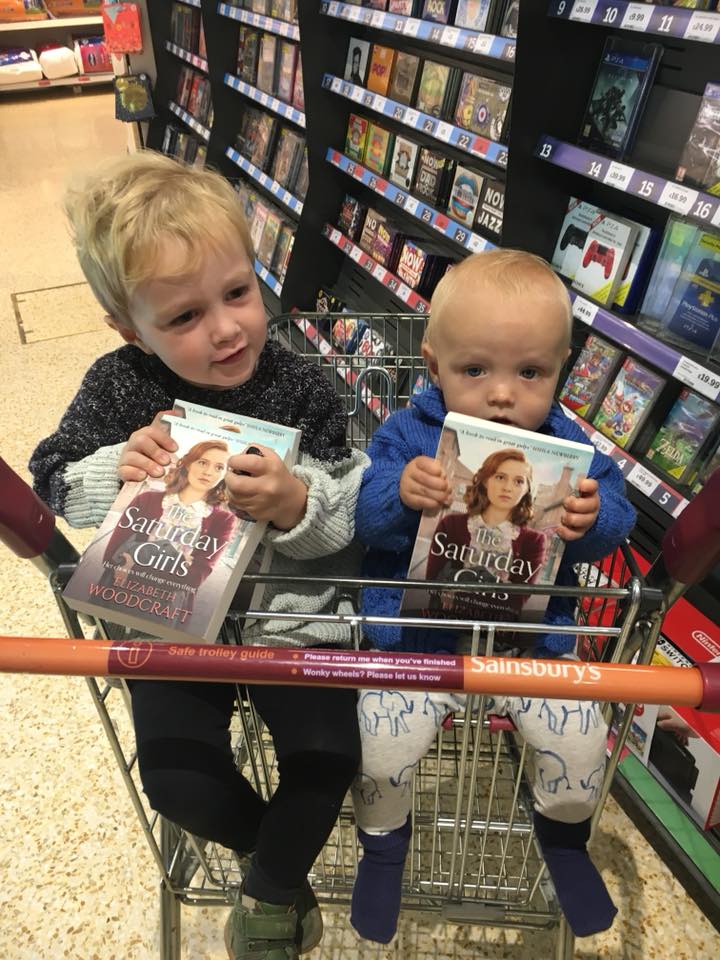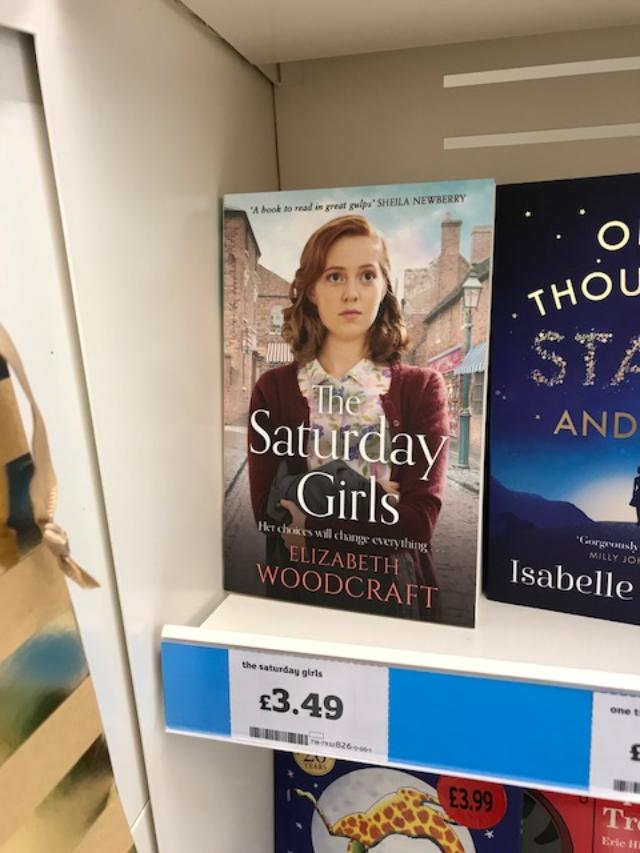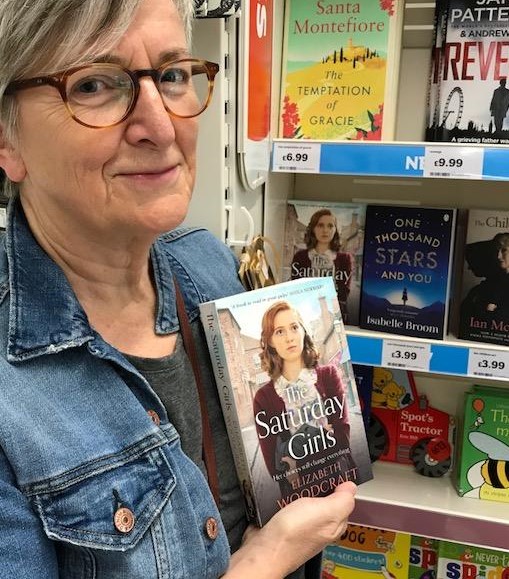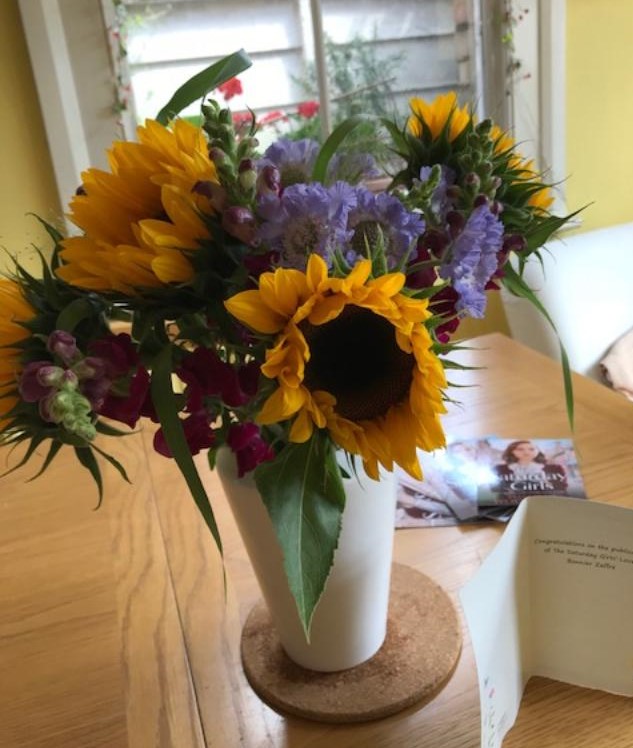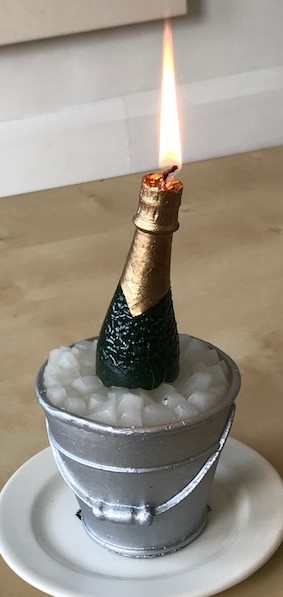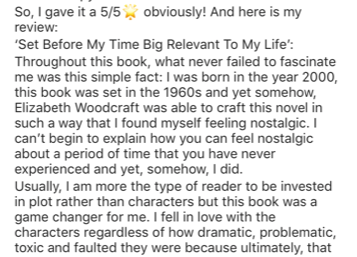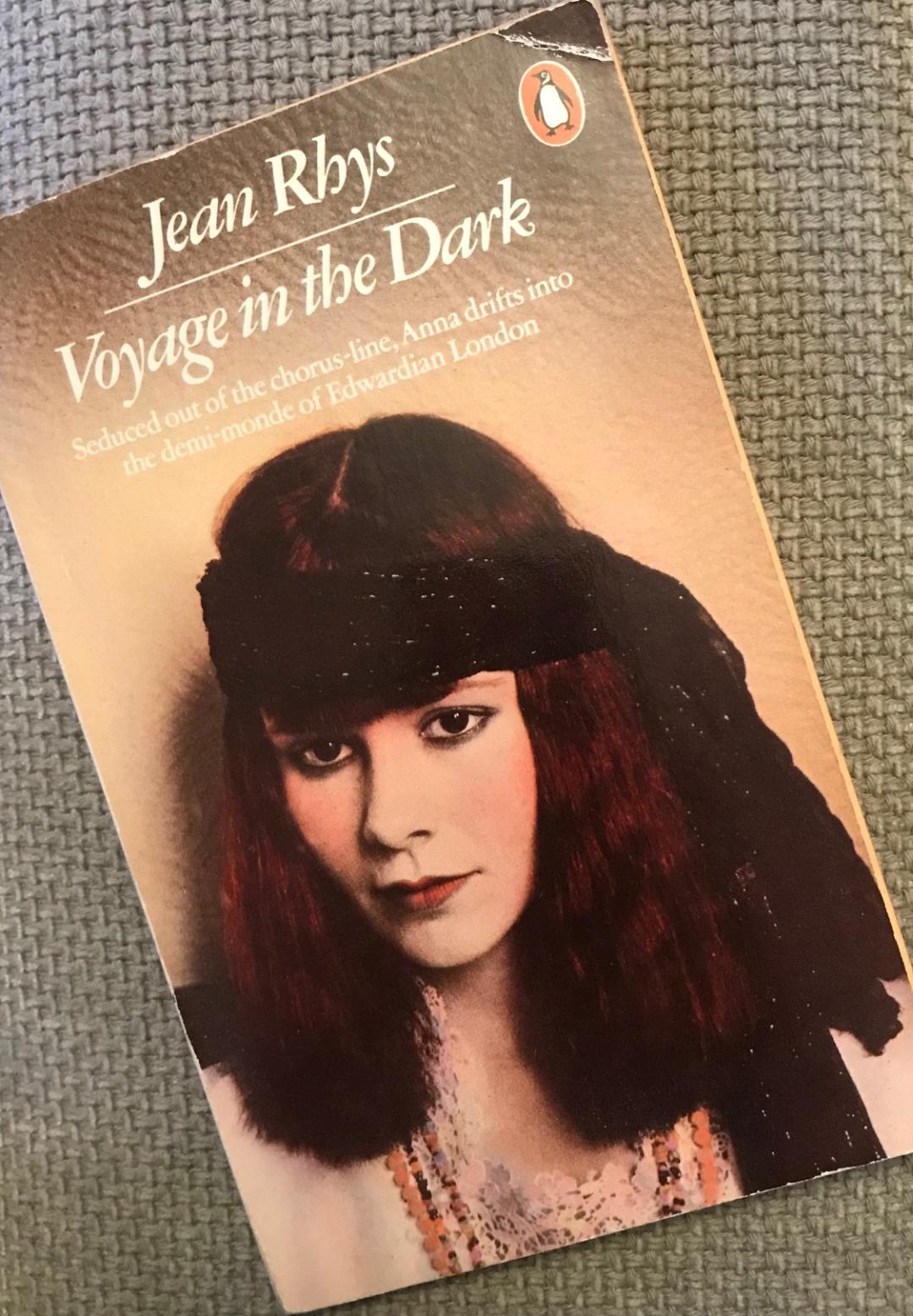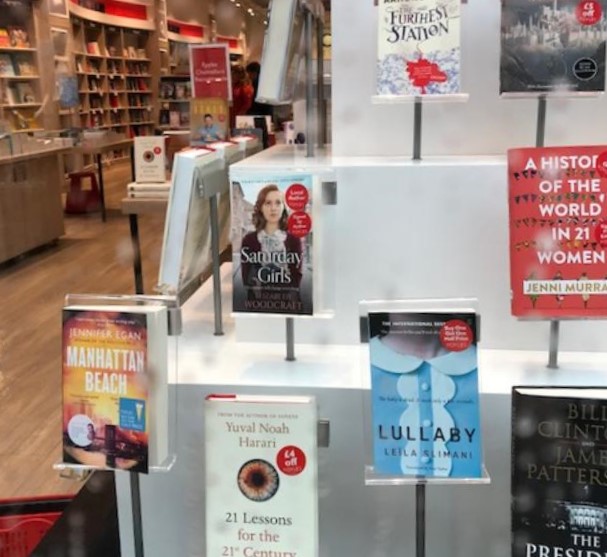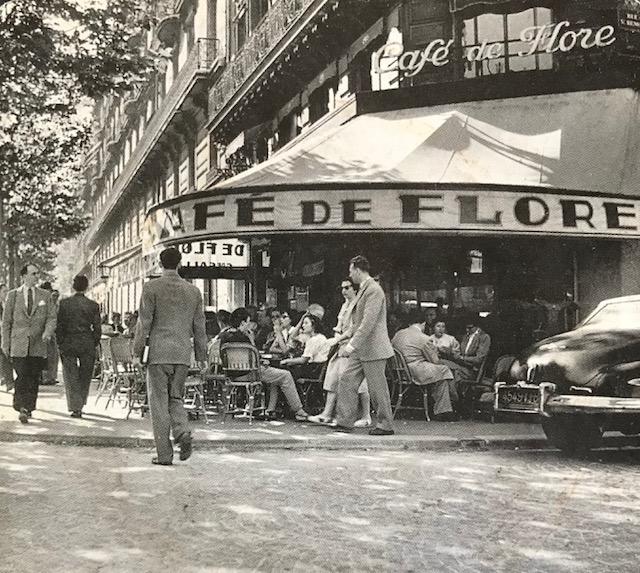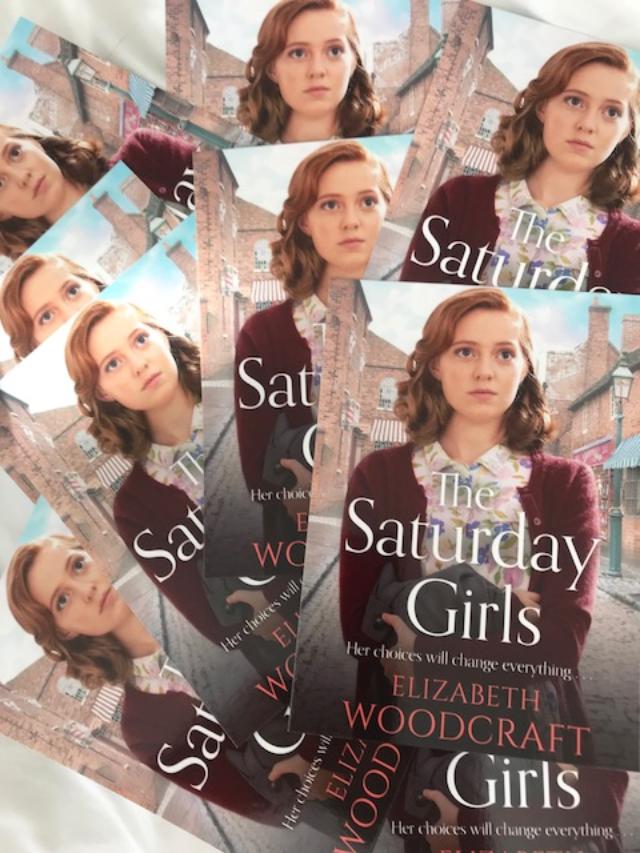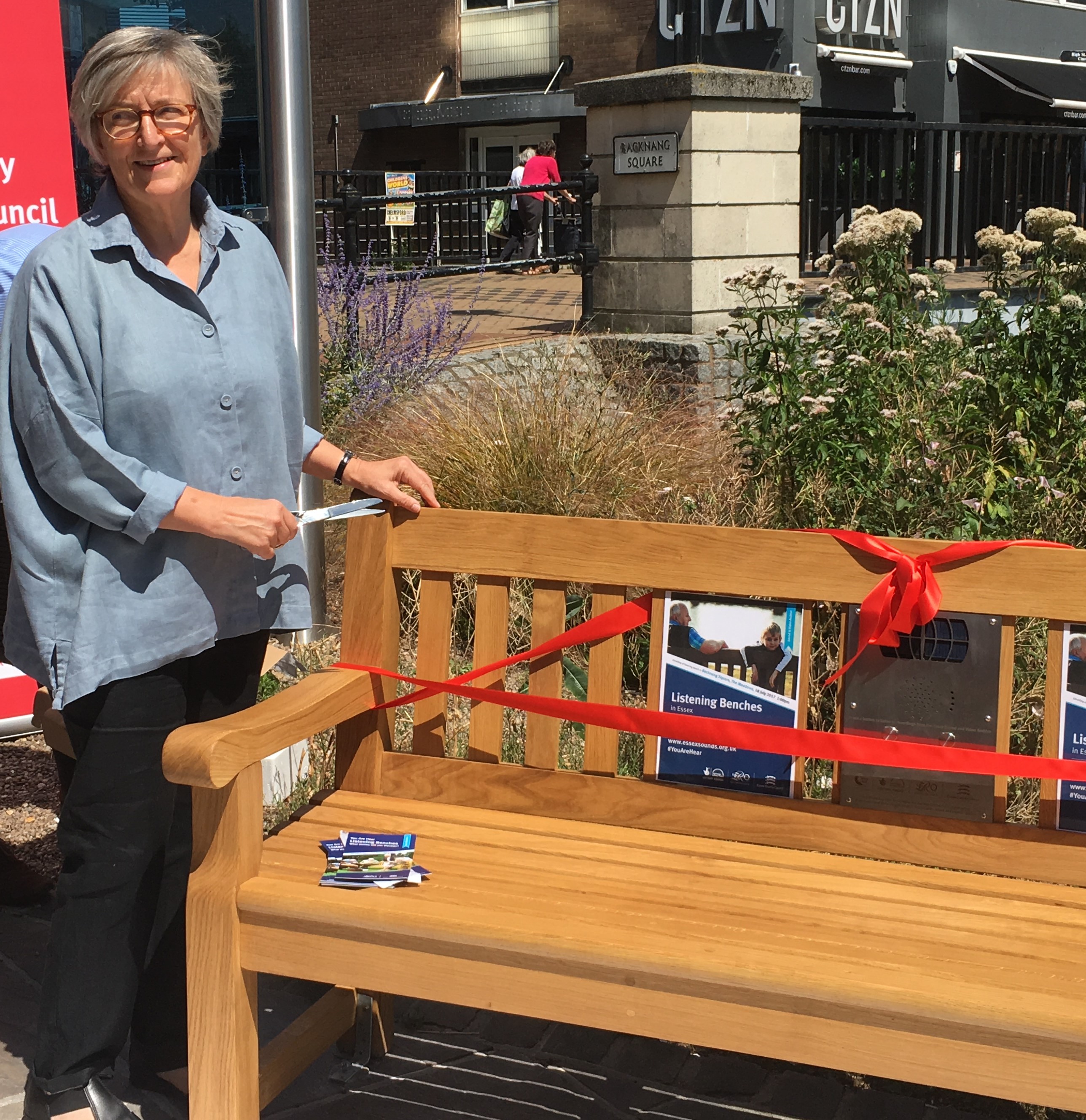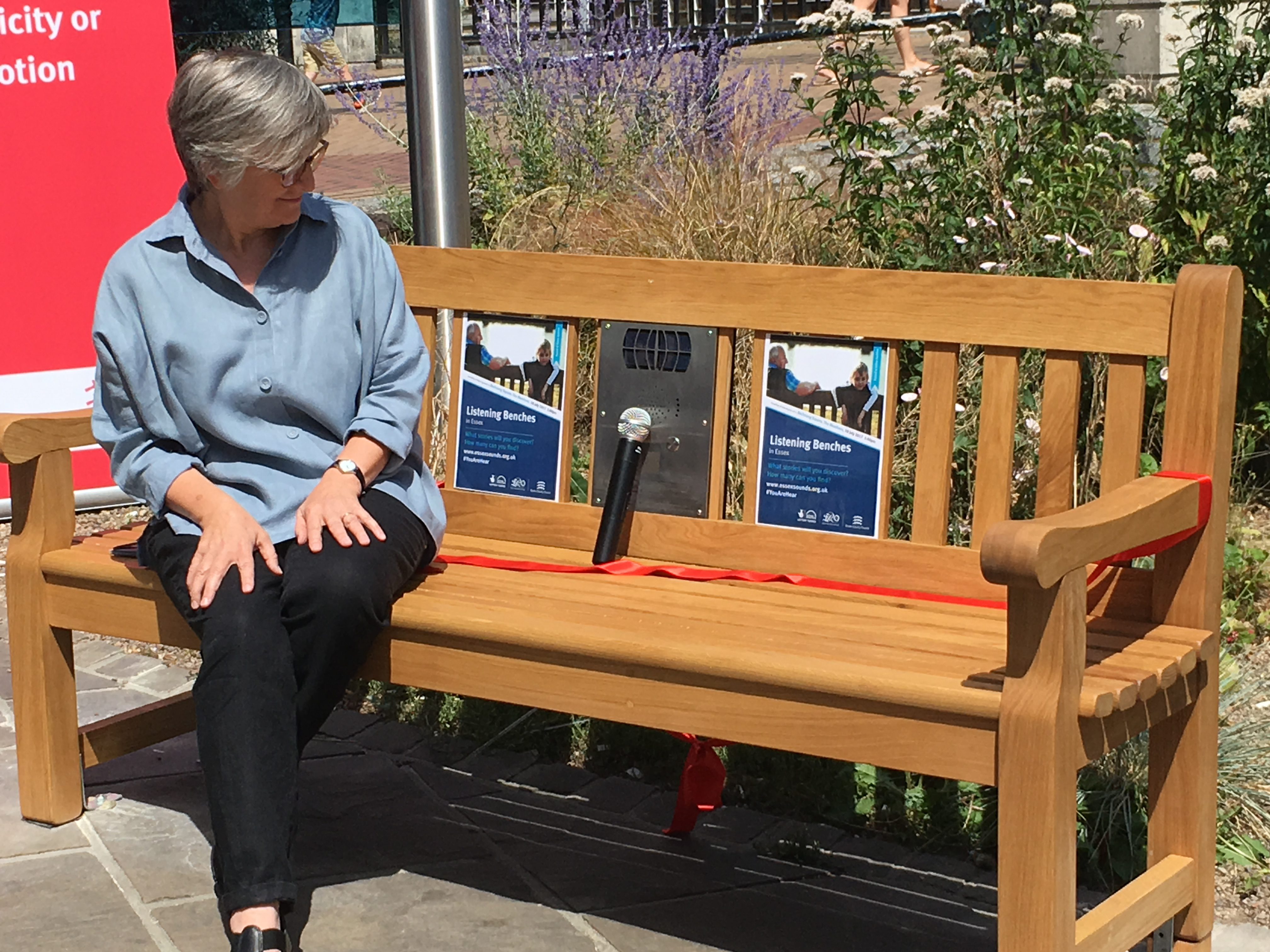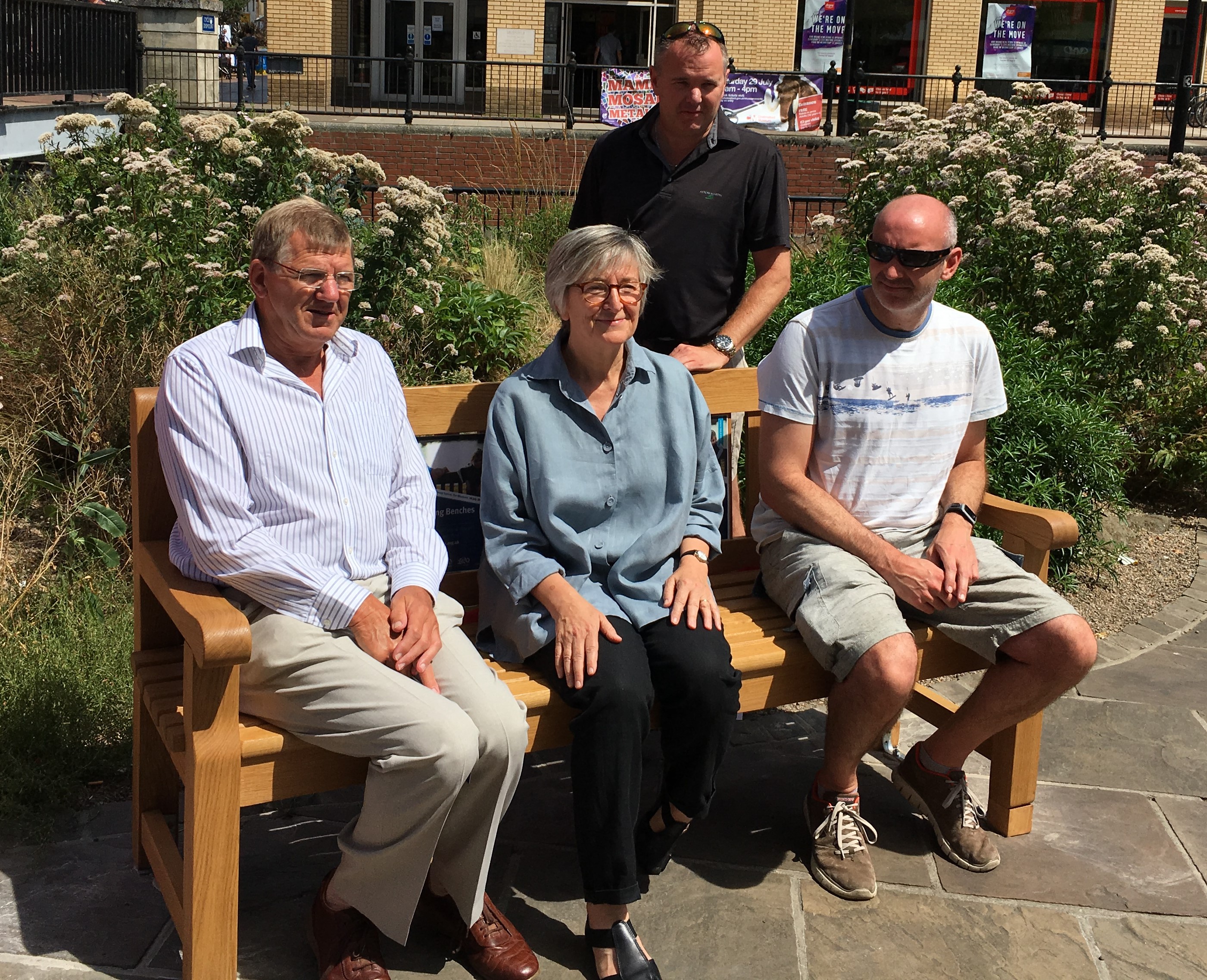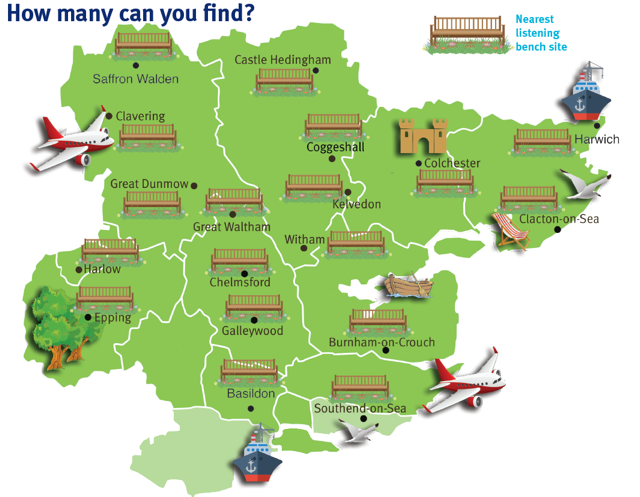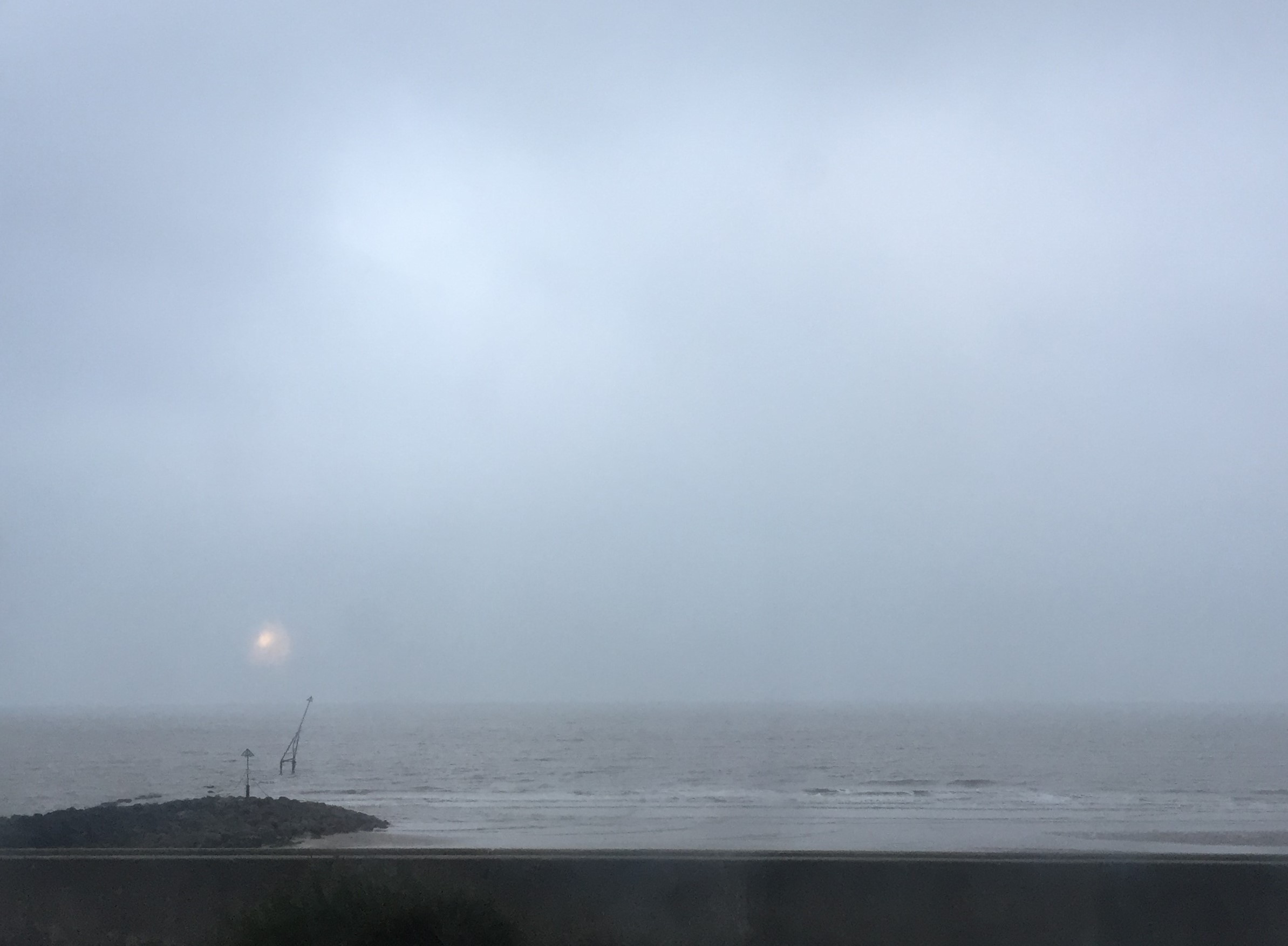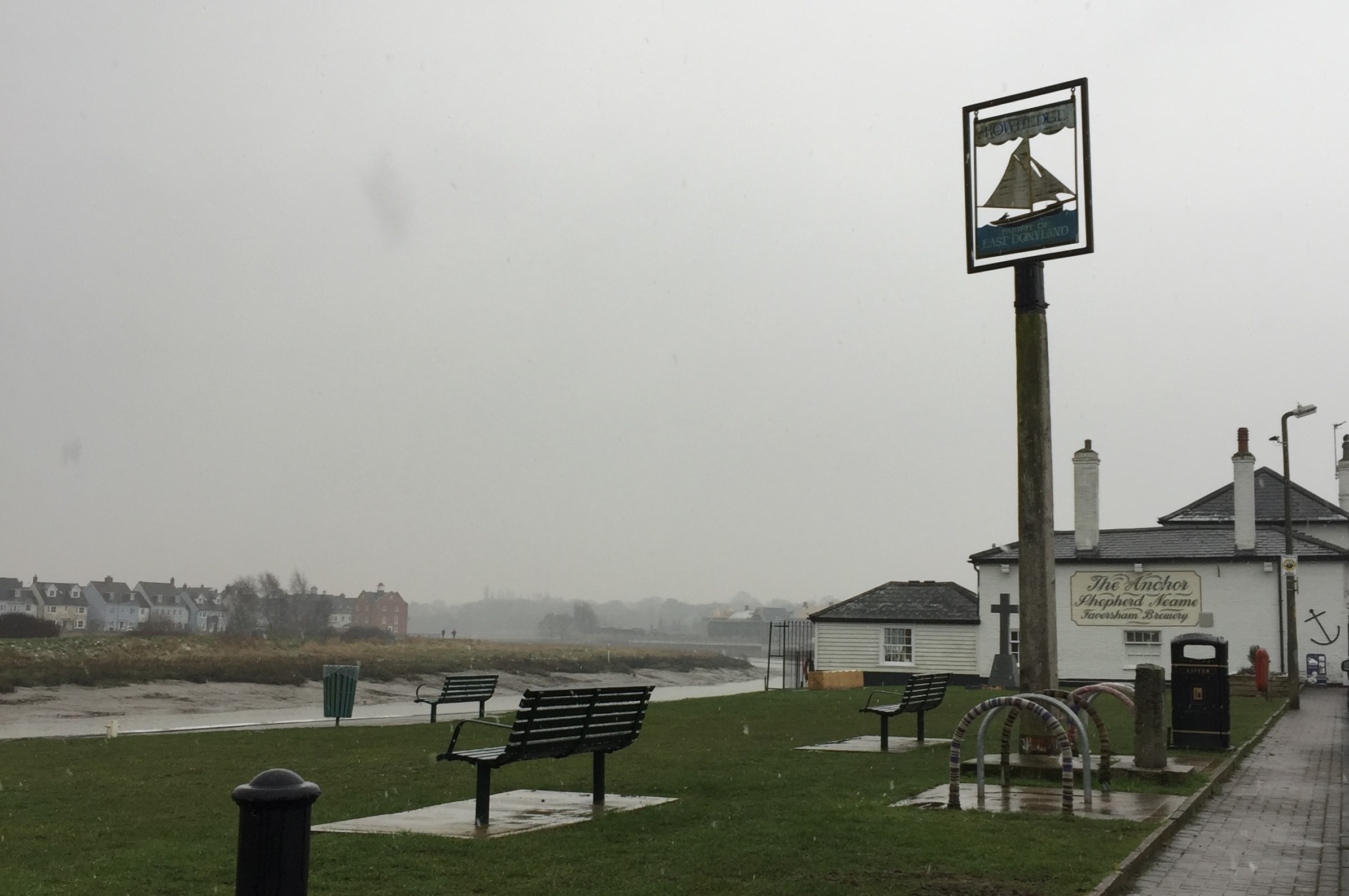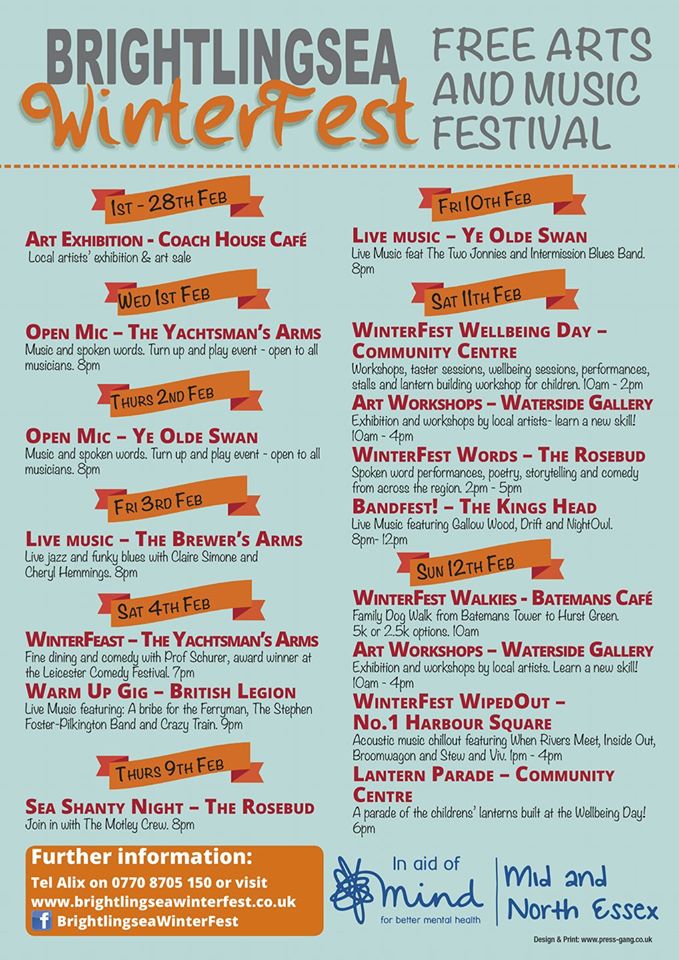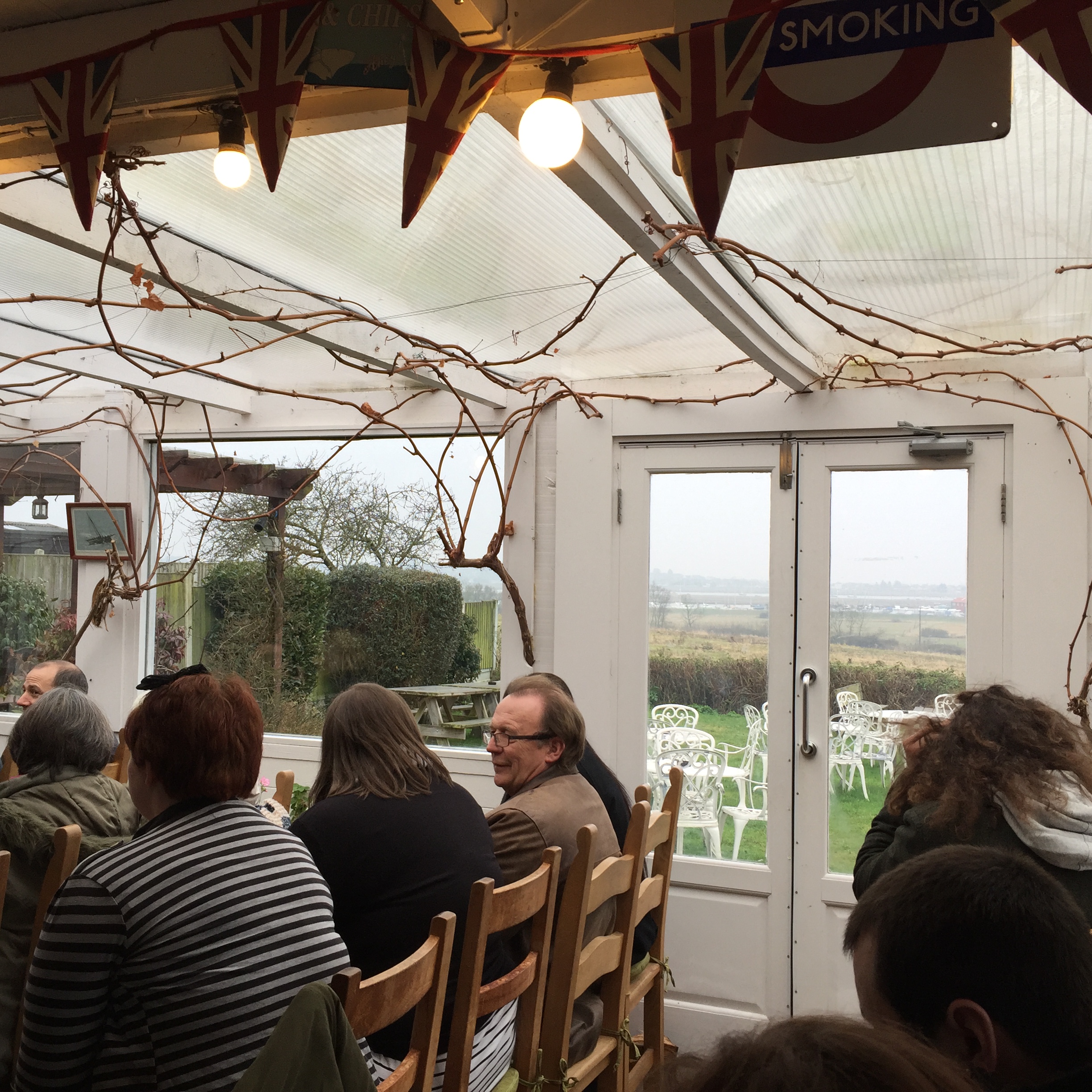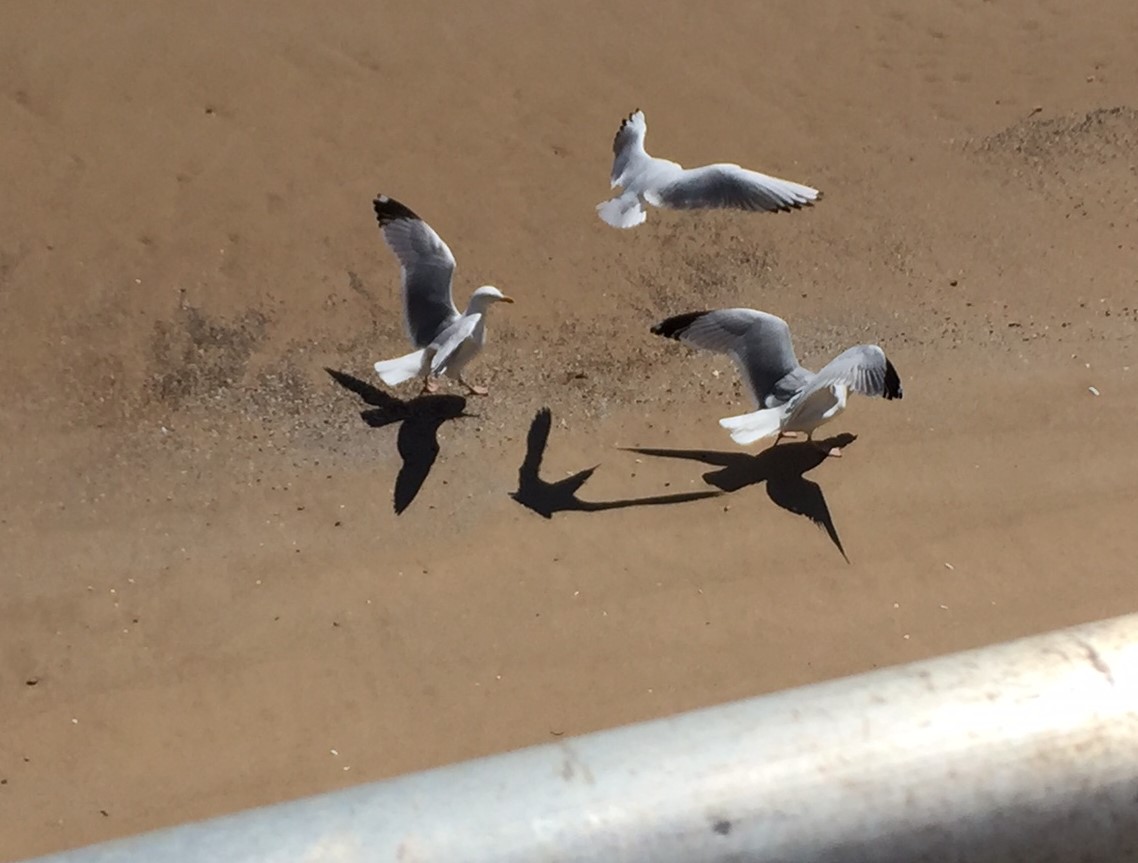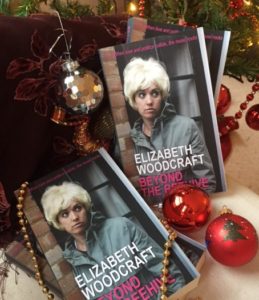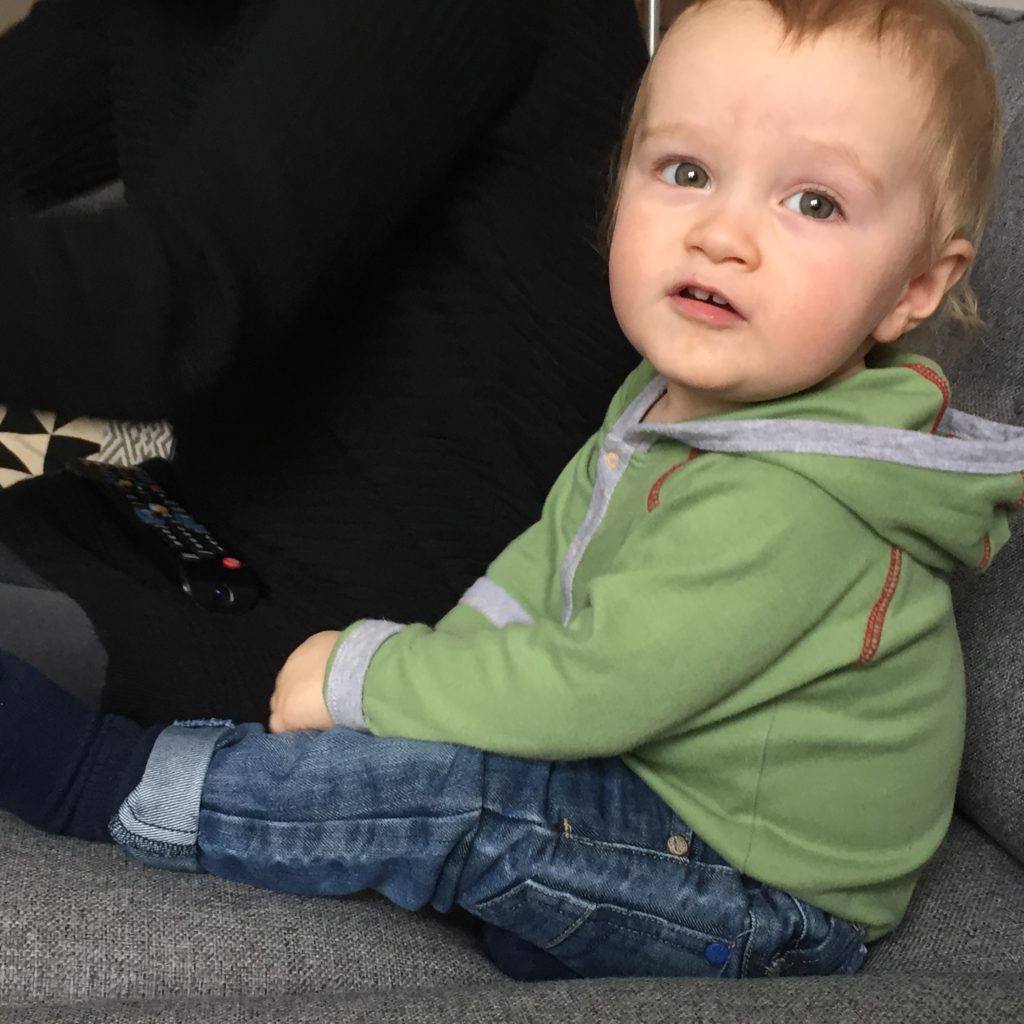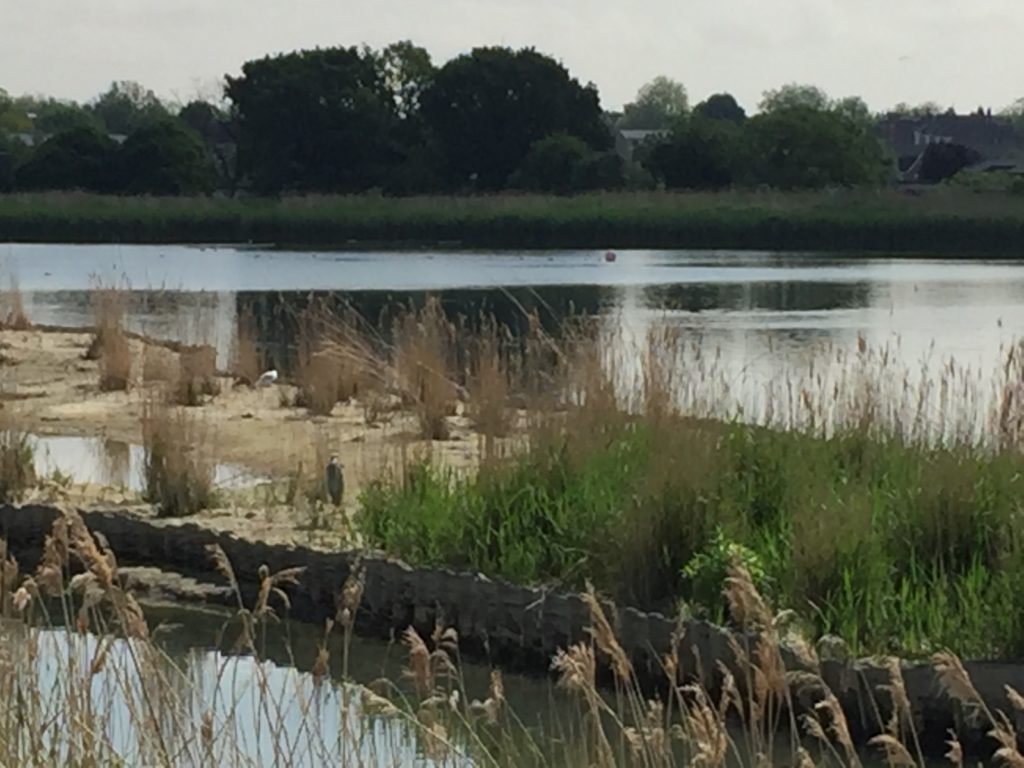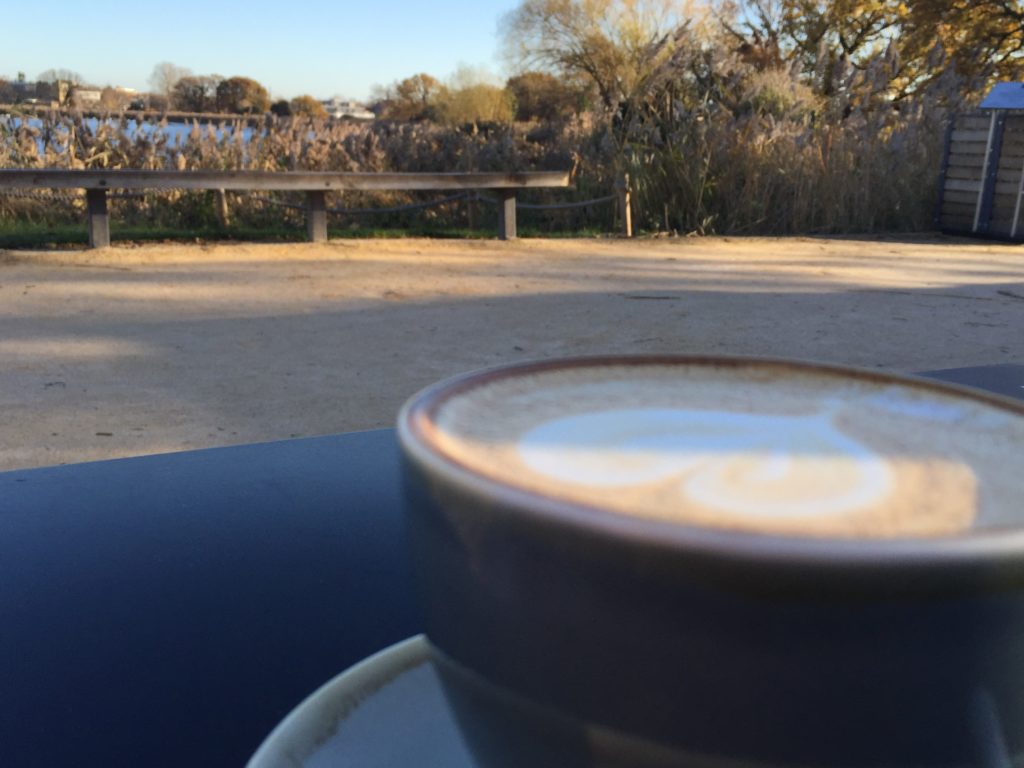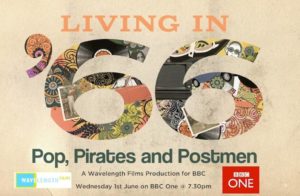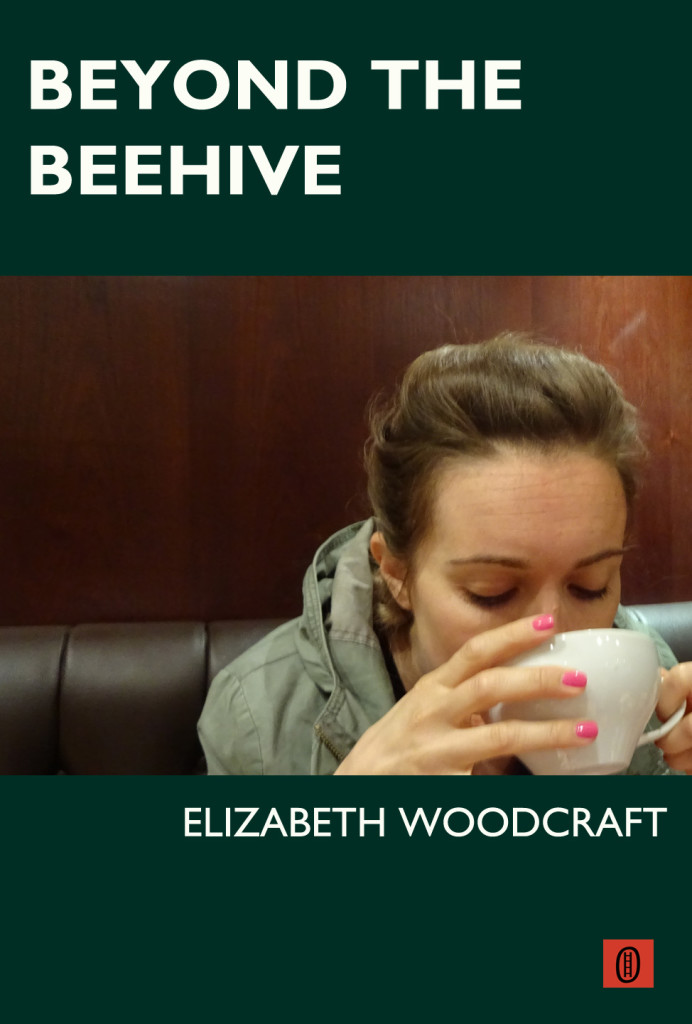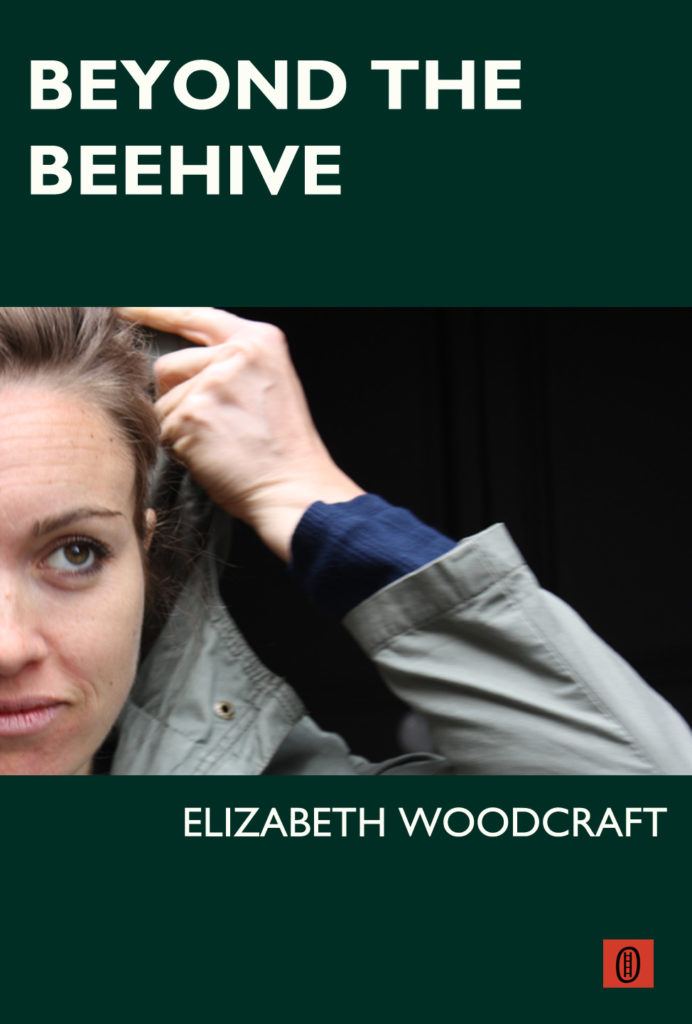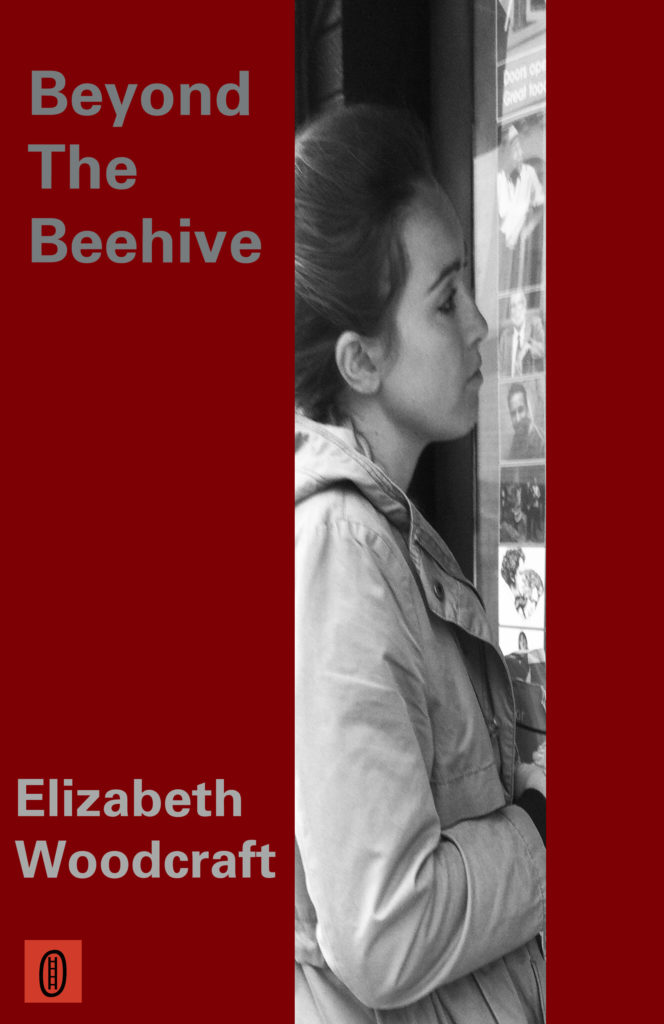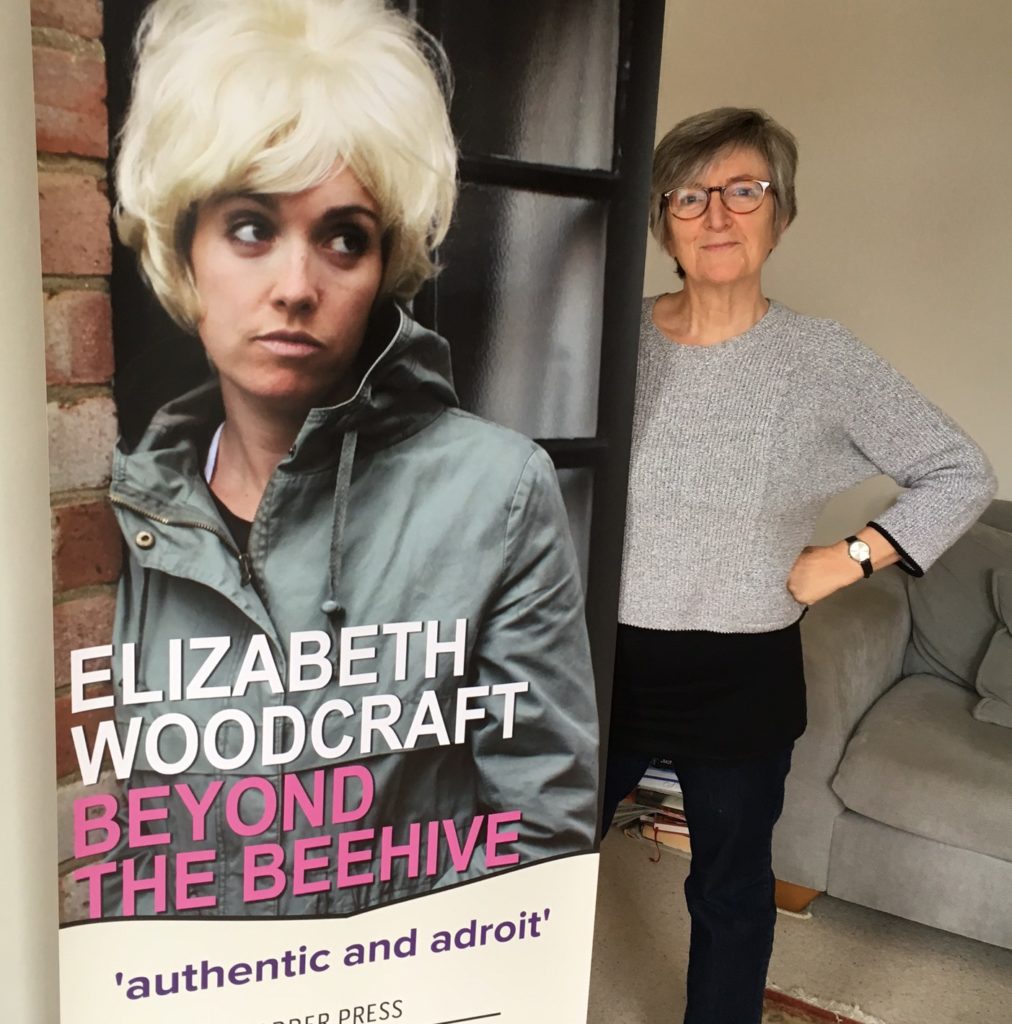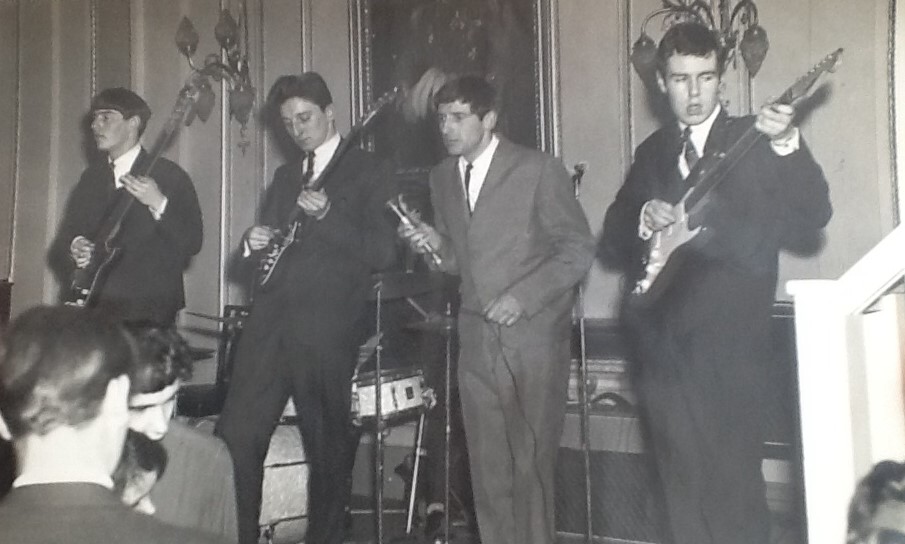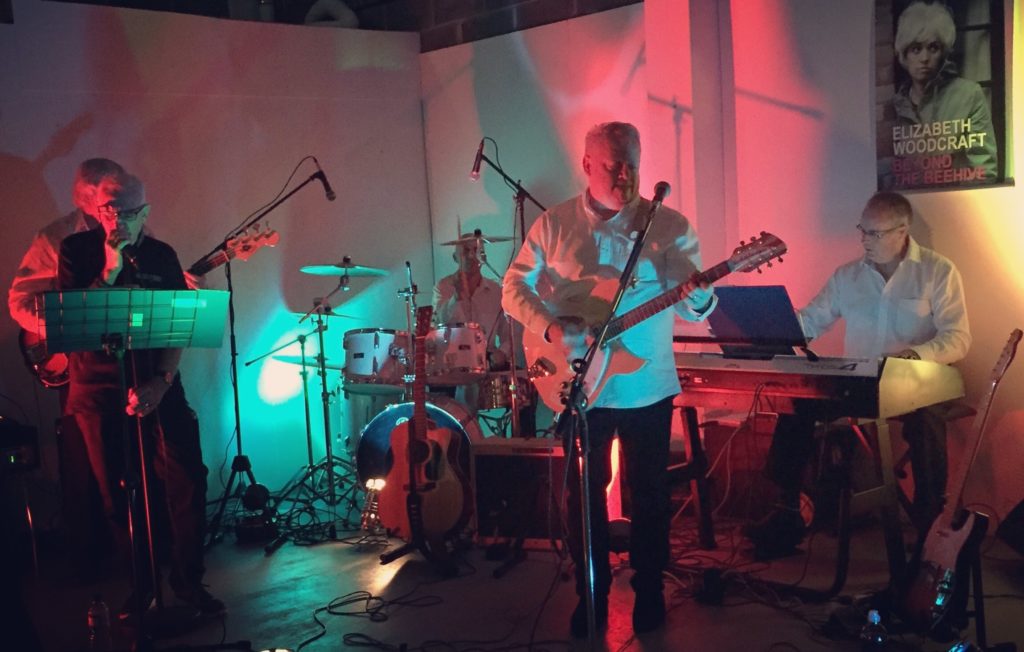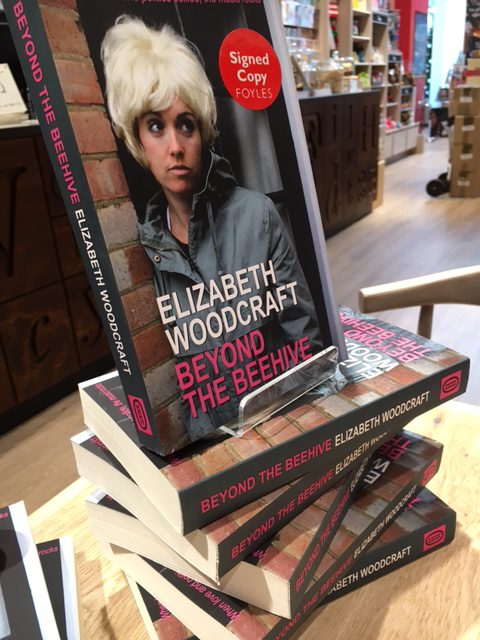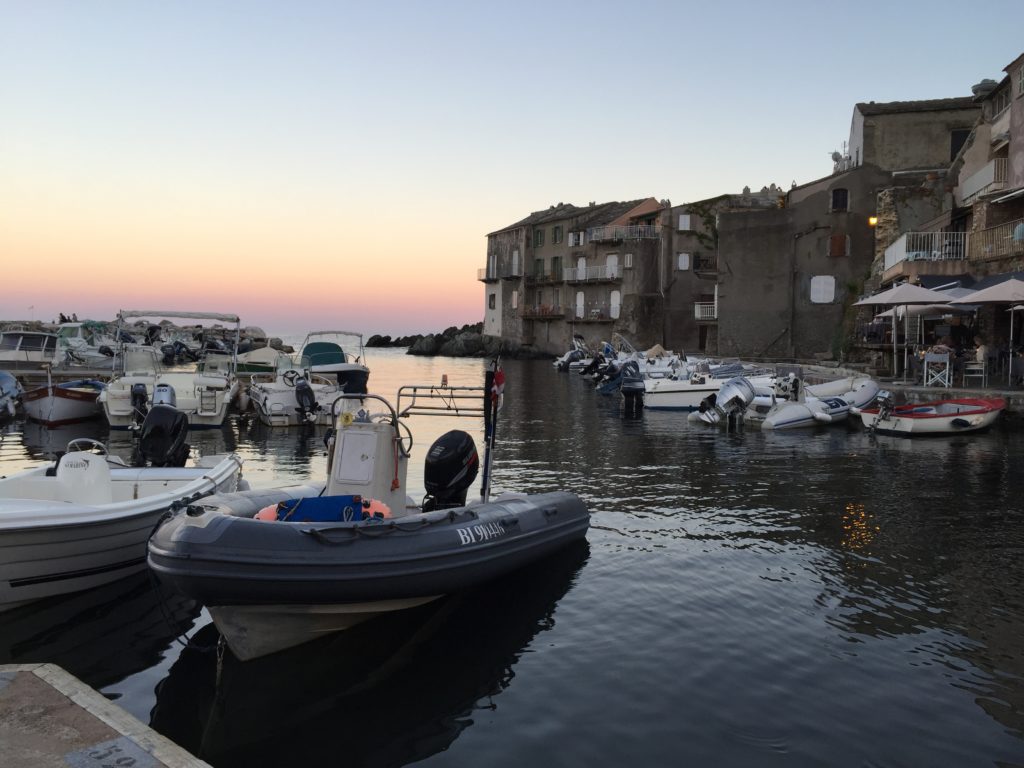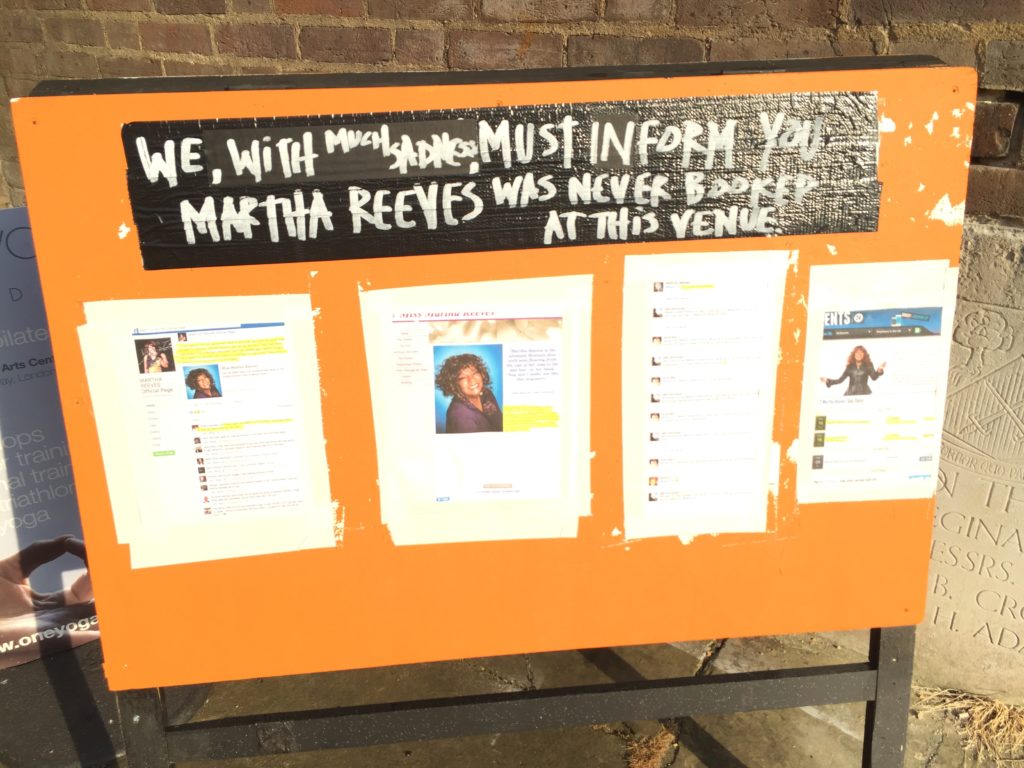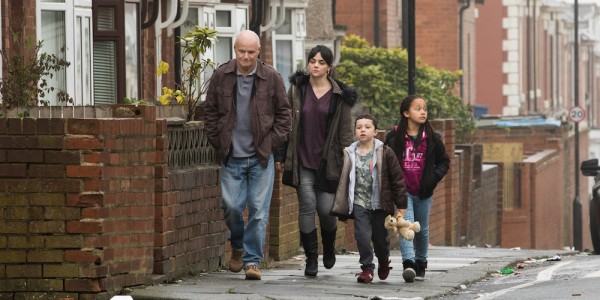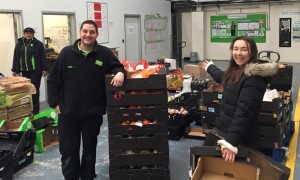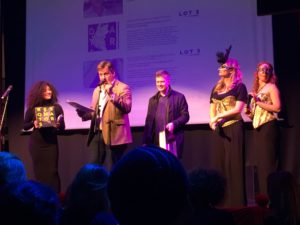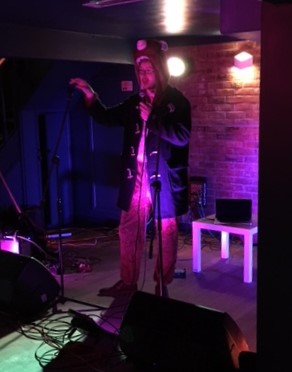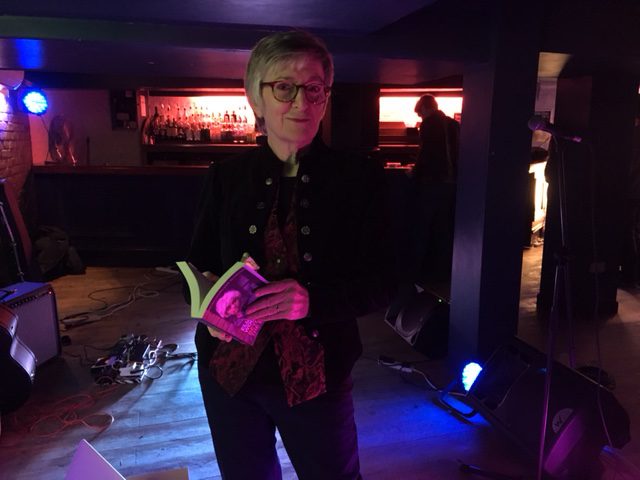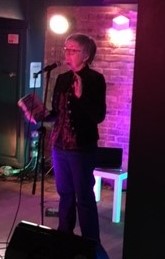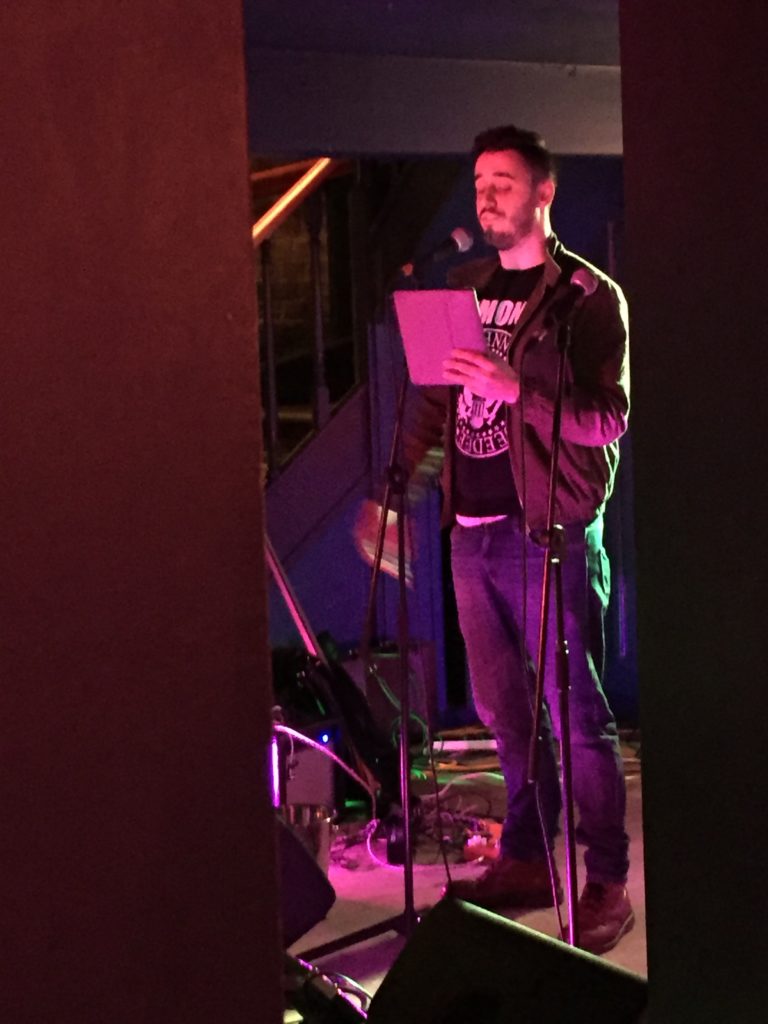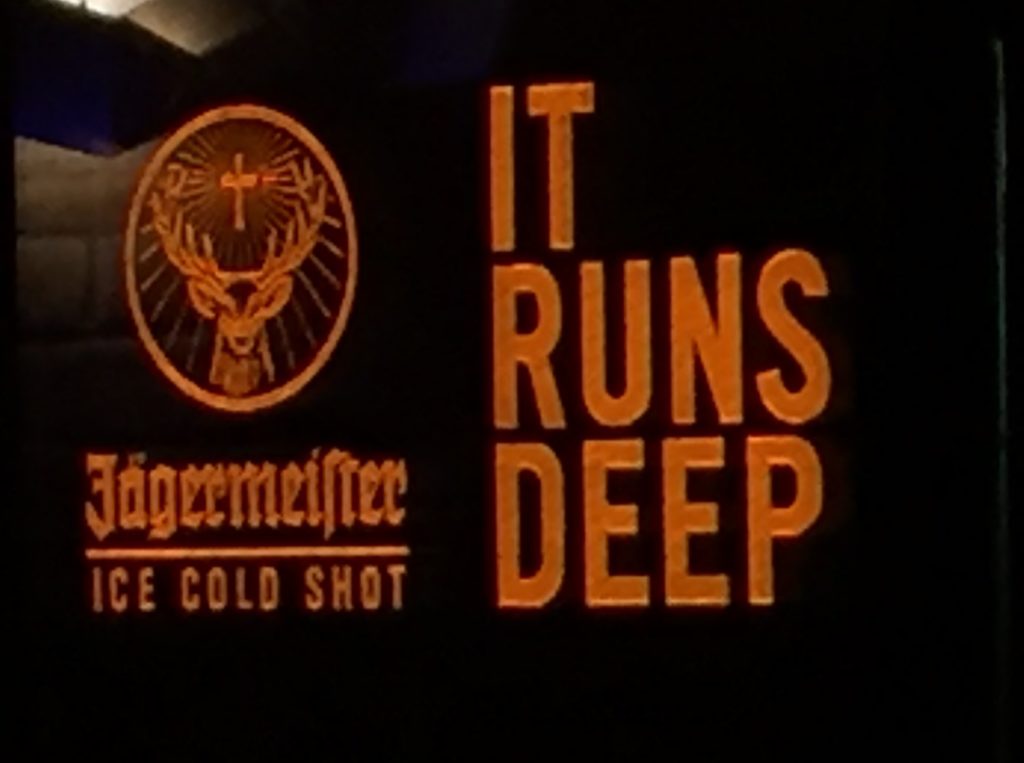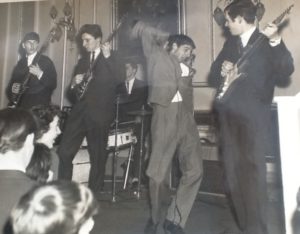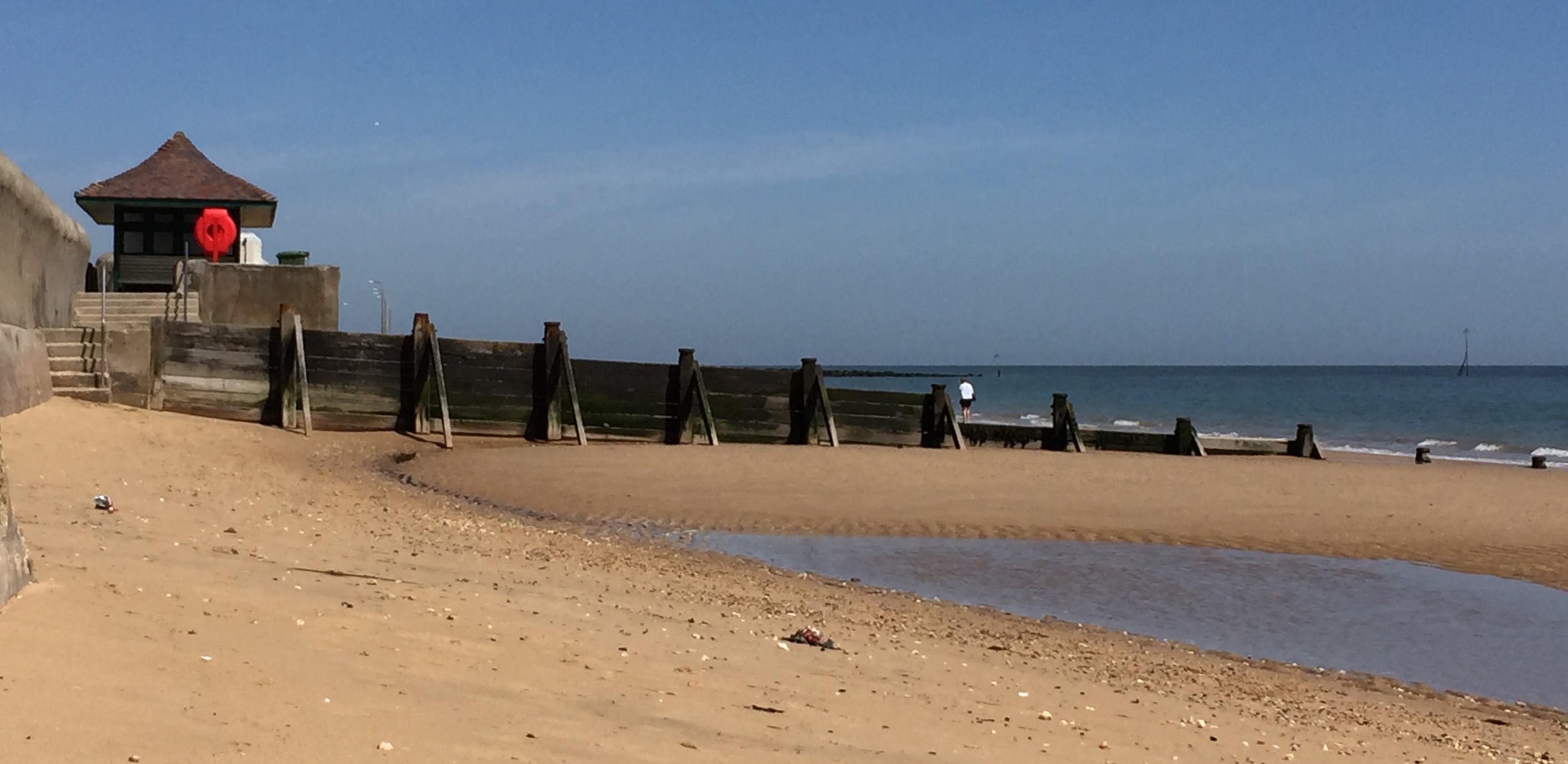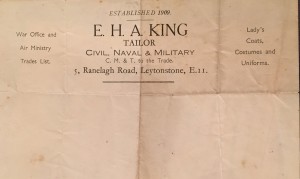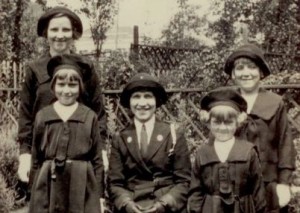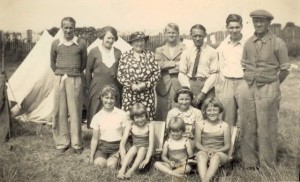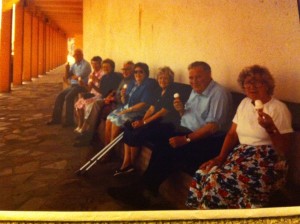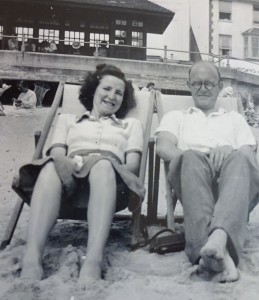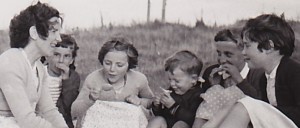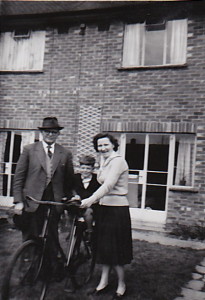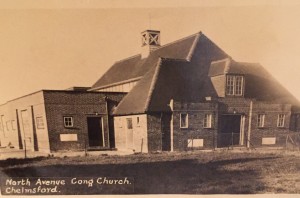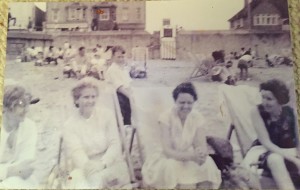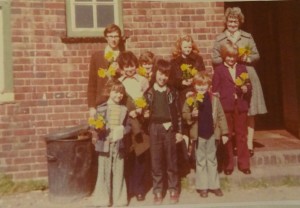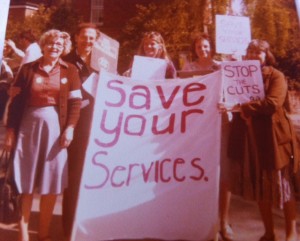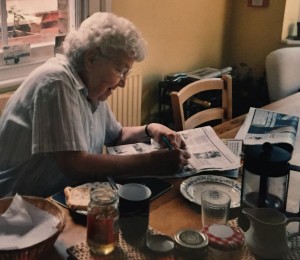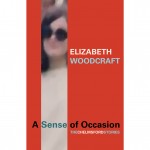Last Thursday, The Saturday Girls, my novel about mod girls in the Sixties, was published by Bonnier Zaffre. The day was very exciting in a quiet sort of way. Quite unexpectedly, my niece first thing went to her local Sainsbury’s with her two sons (3 and 1) and sent me a photo of them in the trolley, holding copies of the book. It was such a lovely surprise and quite moving – that she should do that, and also that the boys should sit quietly and hold the book nicely. I have to say, other photos show them considering eating the books, but hey.
Tag Archives: Chelmsford
Listening Bench
Unveiling the Chelmsford Listening Bench
On Tuesday 18 July on the banks of the River Chelmer, the Chelmsford Listening Bench was declared open.
At 1 o’clock the sun was shining, a light breeze was blowing and a crowd of fiends, passers-by, relatives of contributors and the volunteers who had worked on the selection of voices, gathered for the ceremony. After a short speech from the mayor of Chelmsford Councillor Duncan Lumley, I cut the ribbon and pressed the first button. I was really delighted to have been asked.
The night before I had been able to listen to the recordings – a selection made from a great number of oral history recordings for the Essex Record Office. One recording was from a man born in 1909 who remembered Chelmsford in WWI, another recording is from someone born in the 20s, who went out walking all day with her friend with a jam sandwich, when Chelmsford was so much smaller and surrounded by fields. Someone else remembered when Hoffmann’s ball-bearing factory was bombed in WWII.
After I had cut the ribbon a man came up to me to explain he was the son of the man born in 1909. What was also wonderful was that he had been a mod, with a scooter and had gone to the Corn Exchange on a Saturday night. We swopped a lot of names. Who knows, he may have stood behind me in the Orpheus in the queue for a frothy coffee and a glass of hot blackcurrant.
What is a listening bench?
It’s a bench with a panel of buttons that anyone can press and, through built-in speakers, hear local people telling stories and talking about the history of the area.
The benches are part of the Heritage Lottery Funded project, You Are Hear: sound and a sense of place, organised by the Essex Record Office.
The idea is that through these benches, the Essex Sounds map,
and touring audio-video kiosks, sound and video recordings will help people develop their sense of place. The Essex Record Office is digitising and cataloguing a number of recordings from the Archive to make them available online, to preserve the county’s past, ‘for the enjoyment, interest and benefit of future generations.’
Listening benches have already been installed in communities across Essex. Each bench plays a selection of clips from Essex Sound and Video Archive recordings – clips about the area chosen by volunteers from that community.
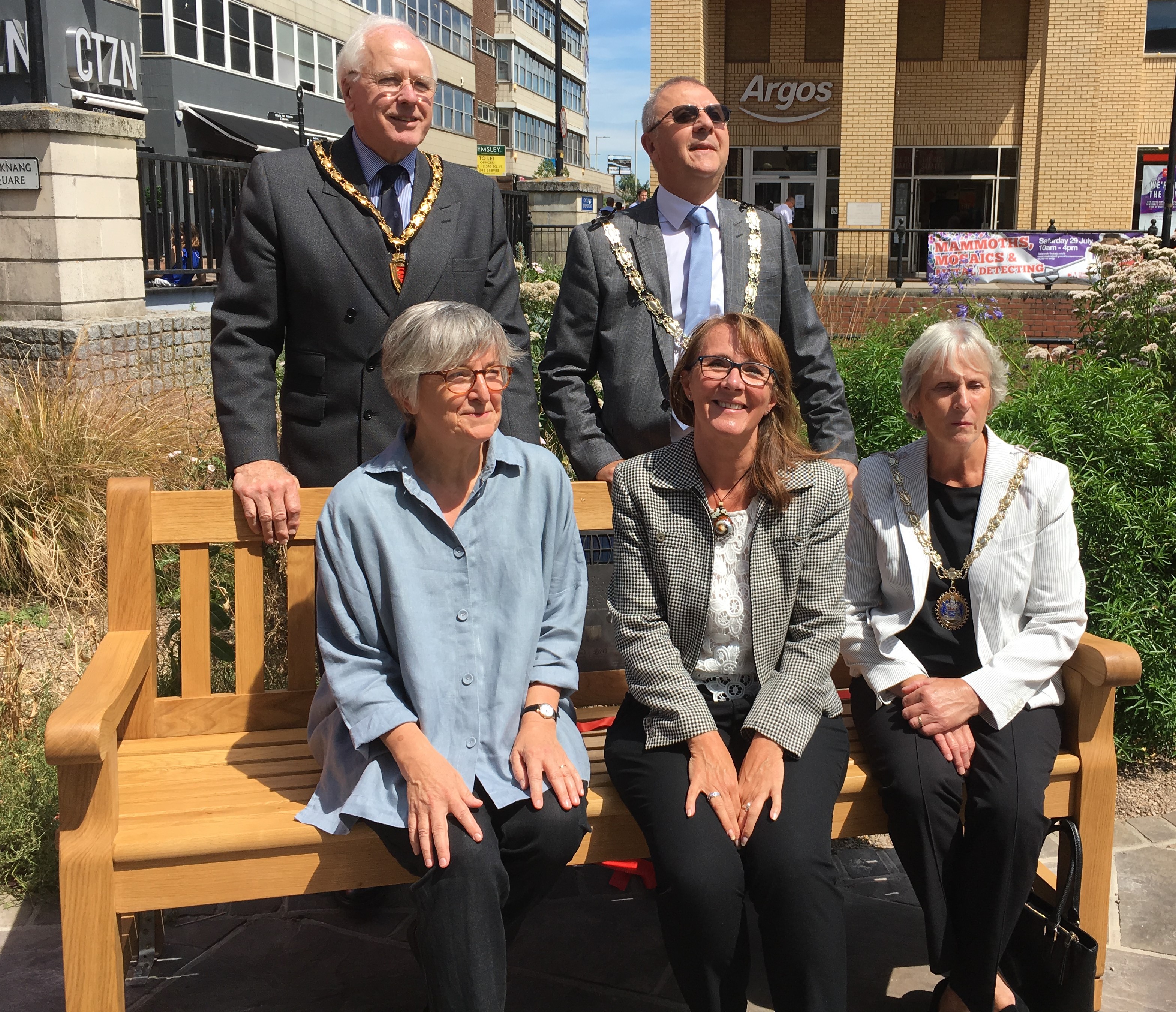 It really was a lovely occasion – and such a good idea!
It really was a lovely occasion – and such a good idea!
Find the bench in Backnang Square, behind the Meadows shopping precinct.
Nobody told me to oil my boots
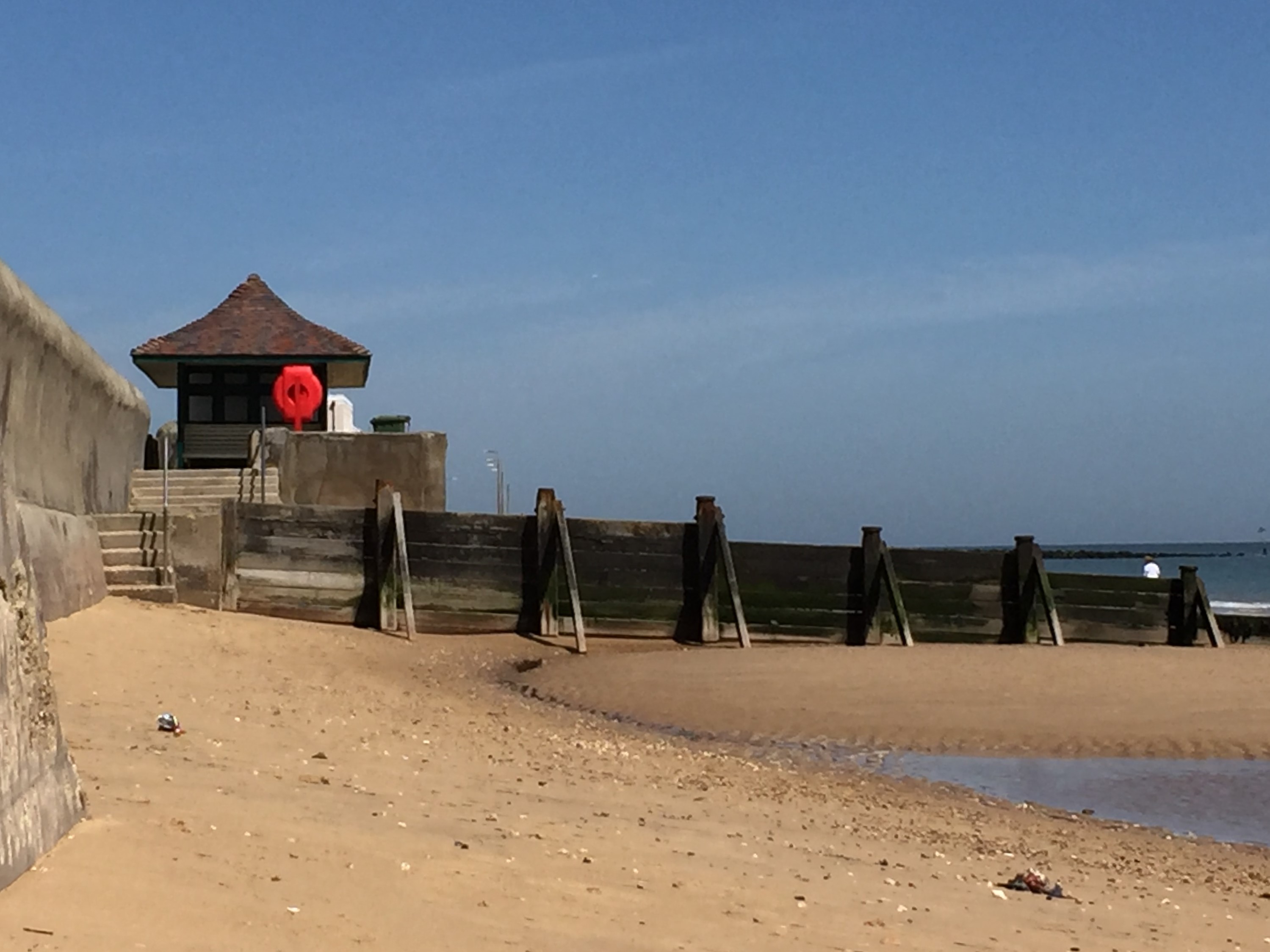 This has been a busy last few days – there was a trip to Walton-on-the-Naze, a place very close to my heart. We went to Walton on our Sunday School Outings, my mum went there as a child, she had her honeymoon there, and we also went on family holidays.
This has been a busy last few days – there was a trip to Walton-on-the-Naze, a place very close to my heart. We went to Walton on our Sunday School Outings, my mum went there as a child, she had her honeymoon there, and we also went on family holidays.
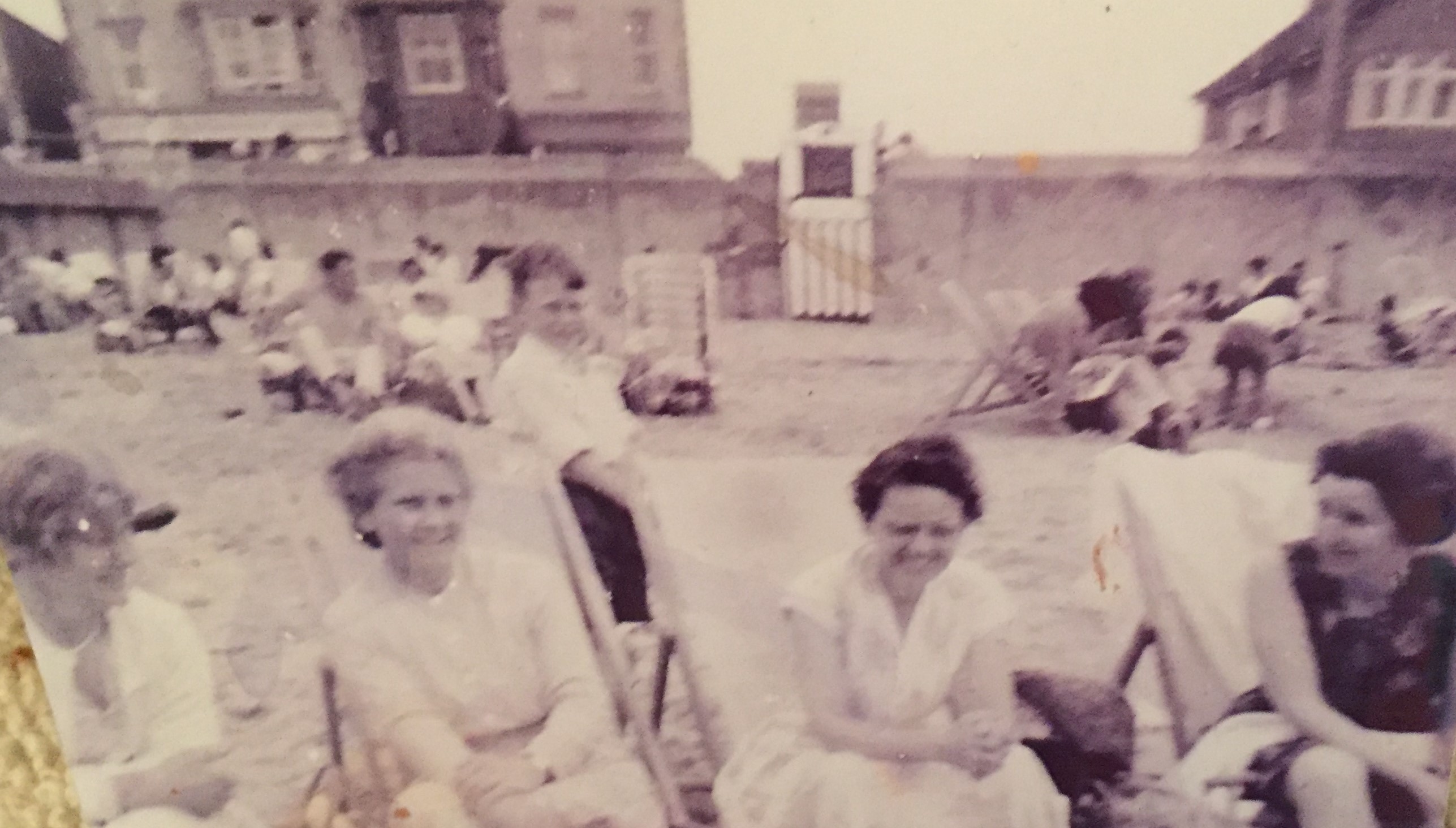 It’s a small seaside town on the Essex coast between the brashness of Clacton and the primness of Frinton-on-Sea. And it has a pier (the second or third longest in the UK, depending who provides the information), with an arcade with penny slot machines, and a ghost train and dodgems. And we have braved wind and rain, and we have sat defiantly on the beach hugging our coats around us. So a trip to Walton was something I was looking forward to.
It’s a small seaside town on the Essex coast between the brashness of Clacton and the primness of Frinton-on-Sea. And it has a pier (the second or third longest in the UK, depending who provides the information), with an arcade with penny slot machines, and a ghost train and dodgems. And we have braved wind and rain, and we have sat defiantly on the beach hugging our coats around us. So a trip to Walton was something I was looking forward to.
But last week it was cold, really cold. The clouds hung heavy and low in the sky. And the pier where we went with a bag of 2p pieces (it is important to prepare for a trip to the seaside), was changed. The rides were unsurprisingly closed, being spruced up for the forthcoming season. The arcade was open – but where were the Tipping Point 2p slot machines? We had come to lose money and there was nowhere to lose it!
And it was so cold.
Things brightened up with a trip to Rowhedge, outside Colchester. We had come to visit an old friend of my mum’s, last seen 30 years ago, in her tiny, warm house in Rowhedge, across the estuary from Wivenhoe. She’d put on a lovely spread of cheese scones, toast, honey, grapes, olives…
She was a great CNDer and also a drama teacher of an evening class round at the Tec. I was in that class and we put on an unforgotten, but occasionally overlooked performance of artistic scenes, during a Chelmsford Arts Festival of the late 60s. We all wore black leotards. It was also the year of my great success in The Crucible – I remember my lines as if it were yesterday. ‘The wings! The wings.’ An exhausting performance.
Then there was Brightlingsea, on the other side of the estuary. It was standing room only in the conservatory of the Rosebud pub, as people crowded in to hear local poets, writers, comedians, story tellers, exhibit their art. It was a wonderful success, not least because the event was part of the the Winter Fest, on behalf of Mind. Not to raise money so much as simply to get people out of their homes, to come and be sociable in the grim winter weather. It was still cold. And I was wearing my ‘performance outfit’ – which meant no vest, very few layers and boots not made of Spanish Leather but some very thin vinyl material. When it was my turn to read my hands could hardly turn the pages. However, once someone had rearranged the microphone and we got going people laughed in the right places, and later I was told people had asked ‘Who was that masked man?’
So it turned into a good weekend. The highlight perhaps had occurred a couple of days before. I had listened in the night to a lovely half hour programme on R4 Extra. Nobody told me to oil my boots told the story of Isaac Rosenberg, a working-class Jewish lad, son of immigrants, a peace loving poet and artist from the East End, who felt it was his duty to join up and fight for his country in WWl. He joined a Bantam Regiment (for men who did not reach the required height of 5’3″). His war poetry is often overlooked, when people concentrate on poets like Wilfred Owen – who was advised to oil his boots. At the end, the R4 poet in residence,Daljit Nagra, summed up by talking about the numbers of Jews and Muslims and Hindus who fought and died in WWl for their country. First broadcast several years ago it is a delicate, powerful, heartbreaking story that is well worth listening to for 30 minutes.
2016 – a look back
Image
It’s nearly Christmas, and as I write the cards and dig out the wrapping paper [note to self, you have enough paper to redecorate Buckingham Palace, do not buy anymore, so what if they have all seen the amusing Santa and reindeer in a headlock motif for the last 5 years? it’s the present inside that counts] I have been reflecting over the last year.
Whoever would have thought, as we snoozed our way through the night into 1 January 2016, that at the end of the year we would be hoping that by some miracle Obama could stay on in the White House for another 20 or 30 years and that Brexit would just be a glint in a silent, forgotten Nigel Farage’s eye? What a year – David Bowie, Leonard Cohen, Alan Rickman, Gene Wilder, Victoria Wood, Caroline Aherne all gone. Not to mention my mum, Peggy Perry, who died at the end of January and my brother-in-law, Alan Fountain, who died in March.
But there were some bright spots. Rudi, the son of niece Billie, born in October 2015, has continued to grow and thrive, spreading awe and wonder (as well as porridge) everywhere he goes.
The Film Quiz Night for the Eave Alan Fountain Scholarship Fund was a great event.
The Woodberry Wetlands is now open, so we wander into a wilderness of birds and bees. And there’s a very nice cafe there too. What a great combination.
In fact, all along Green Lanes, new coffee shops have been opening. As well as Blend and Mokka (OK Wightman Road) we now have Beans & Barley, Beans & Music and Jam in a Jar, so we can drink Flat Whites any time we want.
But this year we decided we would become fit, healthy and toned – that is, more fit, healthy and toned than we already were, obviously, and to this end we decided we would try to walk 1000 miles in a year. That’s about 3 miles a day. Both C and I have a pedometer app on our phones which is a bad thing, because now we can’t bear to be without our phone to clock up the miles – even walking round the house. We have about 6 weeks to go and I am going to need an average of about 15 miles a day if I am going to hit the 1000 mile target. That’s even including numerous comfort breaks.
Unfortunately, before the toned part of the fitness regime could kick in, I got an email from a production company making a programme called ‘Living in ’66.’ This was for BBC1 who were putting on a number of regional programmes, all to be shown on the same night. I was asked to be in the BBC East programme ‘Living in ’66 – pop, pirates and postmen‘. Because I had my 1966 diary. On a cold day in March I met the crew and BBC Radio 6 DJ Steve Lamacq in the Saracen’s Head pub, in the middle of Chelmsford.
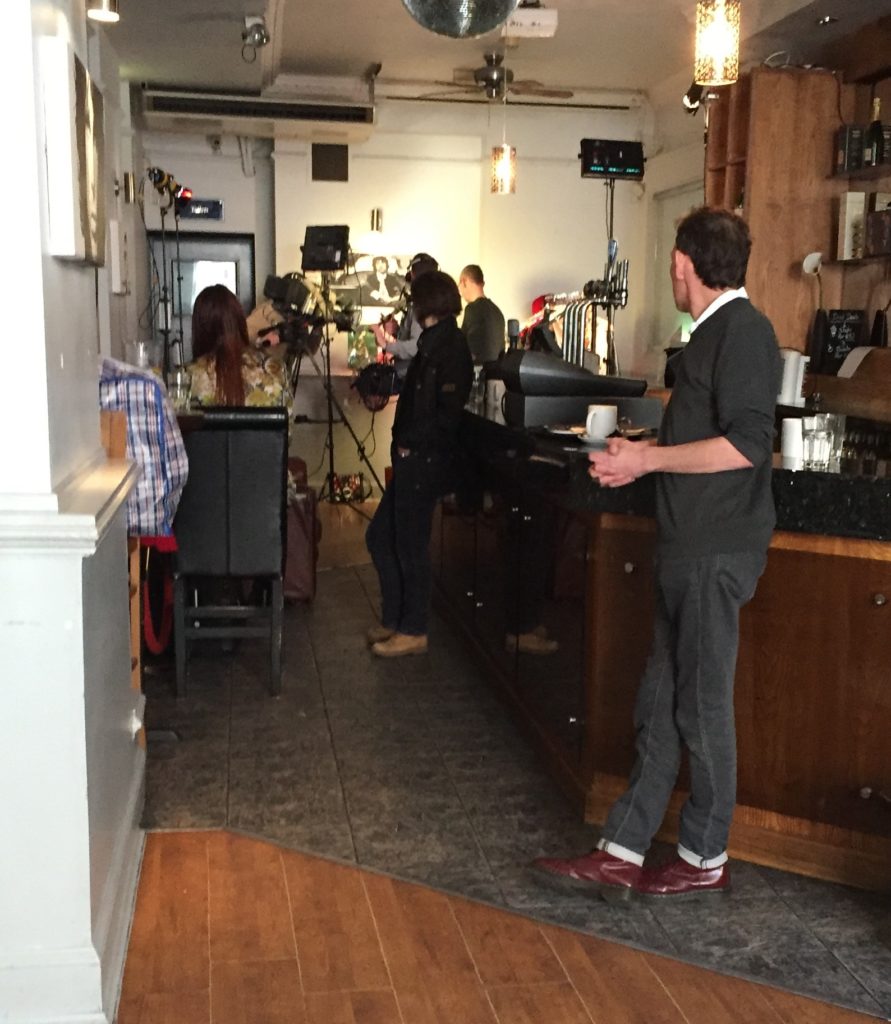 After I had taught Steve Lamacq how to do the Mod jive, we walked round Chelmsford (I also taught him how to do the Mod Prince Philip walk) while I read passages from my diary.
After I had taught Steve Lamacq how to do the Mod jive, we walked round Chelmsford (I also taught him how to do the Mod Prince Philip walk) while I read passages from my diary.
The programme, which aired (as we say in the business) on 1 June 2016, kickstarted a relay of rather fab events. An interview on BBC Radio Essex, about the show led to an occasional 6am appearance on BBC Radio Essex reviewing the newspapers, being interviewed by historian Stephen Norris as part of an oral history project about life in Chelmsford in the 50s and 60s, discovering the Ideas Hub – a Chelmsford coffee shop that is also the venue for all sorts of talks and exhibitions, where I talked about being a teenager in the 60s.
And finally, after approximately – hmmm – 30 years, Beyond the Beehive, my novel about life in 60s Chelmsford, finally saw the light of day. That has been a source of great pride and pleasure, and it’s lovely having Billie on the cover. We spent a morning in Soho trying out different images.
But East West, home’s best – we decided on the one taken outside our back door. 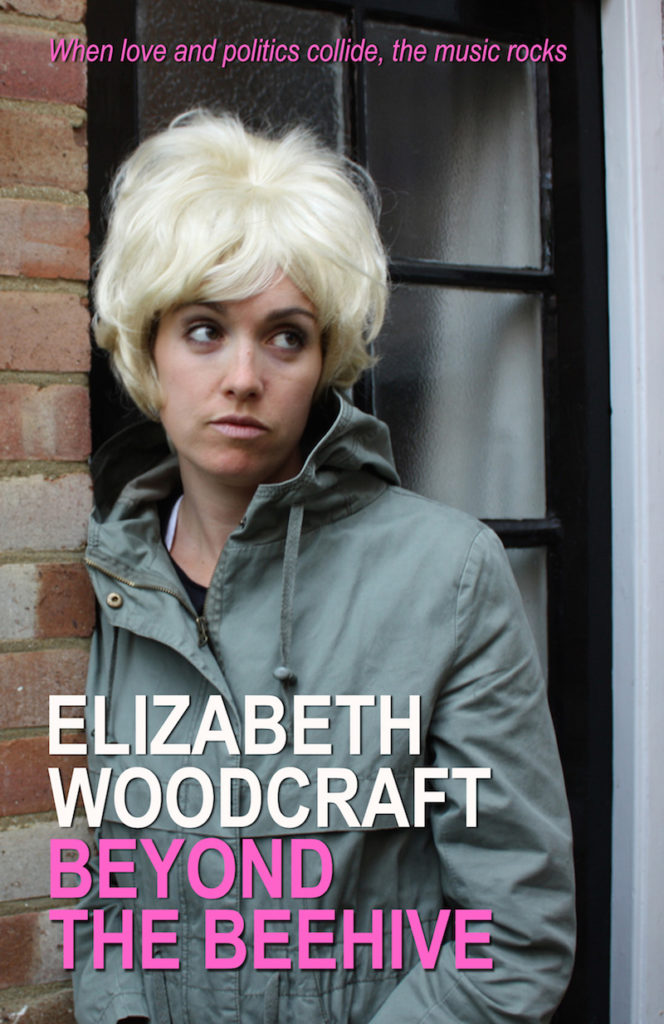
Local group Mark Shelley and the Deans, who played the rocking good sounds we danced to in the Sixties at the YMCA in Victoria Road, got in touch and agreed to play at the launch in Chelmsford which was fantastic.
After that there was a great launch in London. I’ve met lots of really wonderful people as I’ve spoken at events and readings. And the book has been selling. In the unlikely event you haven’t bought it yet – get down to Chelmsford Foyles now (or Sherry’s in Broadwick Street, London, or the Big Green Bookshop in Wood Green, or go online)!
Every year Goodreads the website for readers, asks you to set yourself a target for the number of books you will read in the year. I set myself the target of 12 (I had a book to finish!!). I’m up to 13 in fact. I really enjoyed The Colour by Rose Tremain, about the search for gold in 19th Century New Zealand (who knew?). There was Michael Connelly, always good solid crime, the quirky Elvis Over England by Barry Hines (the author of Kes). I read The Girl on the Train – hmm. I also went back to my very (old) favourite Jean Rhys, Voyage in the Dark. But my favourite book of the year was a Margaret Forster novel, Keeping the World Away, about a small painting that changes hands from woman to woman through the years. A lovely story about becoming and being an artist.
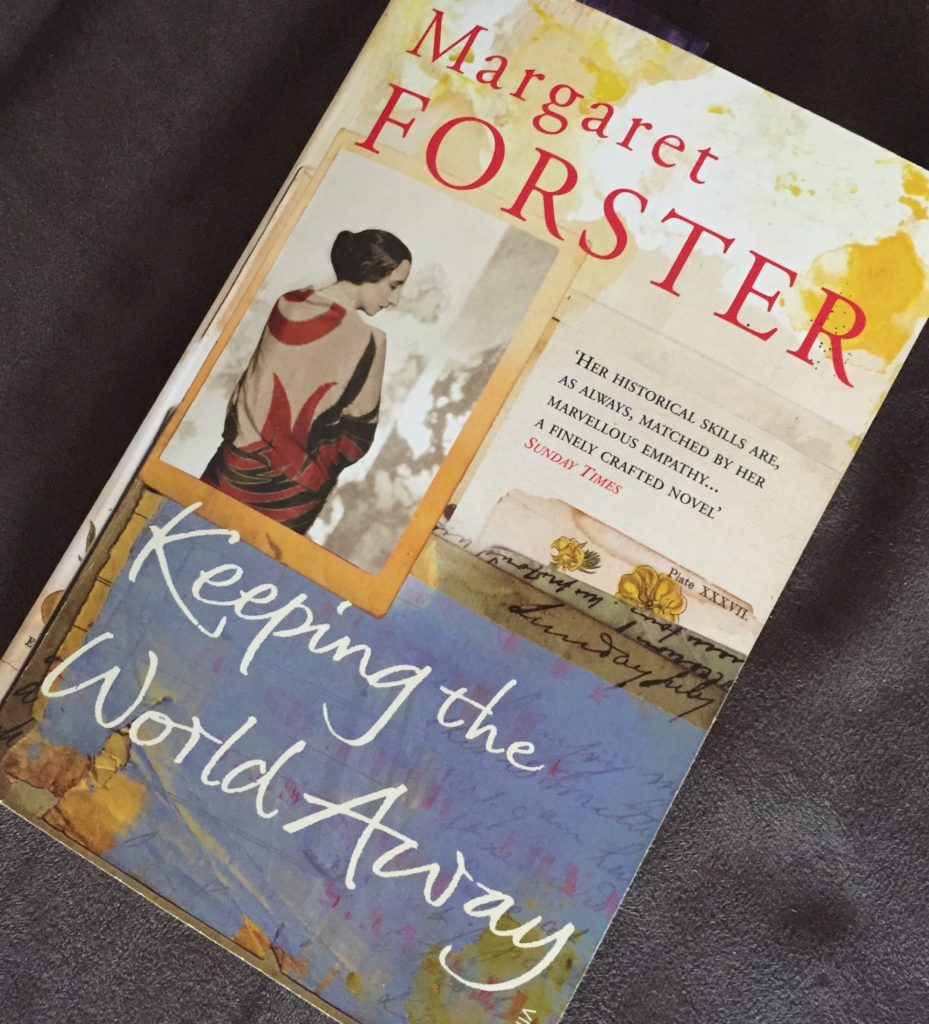 We discovered Corsica. We expected bandits and vendettas, and bitterness at French ownership of holiday homes. What we found was stunning scenery, friendliness, good food and interesting history.
We discovered Corsica. We expected bandits and vendettas, and bitterness at French ownership of holiday homes. What we found was stunning scenery, friendliness, good food and interesting history.
There were a couple of disappointments – going to see Funny Girl when neither Sheridan Smith nor her fabulous understudy were performing. And then when we turned up to Hornsey Town Hall to see Martha Reeves of Martha and the Vandellas we were met by disappointed concert-goers and notices saying, ‘She’s not here, she was never going to be here, there is nothing to see here.’ And the agency that had been selling the tickets was unavailable and their website had disappeared.
So we went and had tapas.
In Crouch End we now have the ArtHouse and the Picture House so we have the pleasure of great choice as well as good parking. Earlier in the year there was a period when every film we went to see was about the 50s – Trumbo and Spotlight were excellent. Bridge of Spies and Carol, were also good, and also 50s, and then recently A United Kingdom told the story of the marriage of the King of Botswana with a white woman from Britain, in the late 40s and early 50s. A film I really enjoyed was Miles Ahead with the wonderful Don Cheadle, imagining a period in the life of Miles Davis.
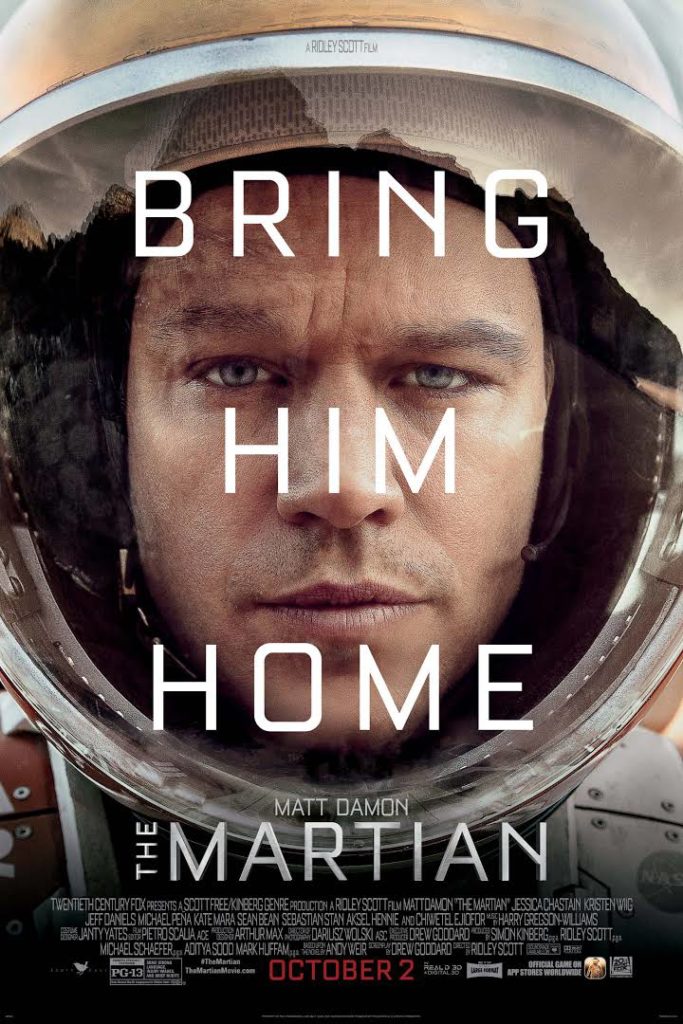 The Martian, with Matt Damon, we saw at a drive-in in Alexandra Palace, in the pouring rain. We arrived in time to order hot-dogs – mine was called Clinton’s Love Child. We ate quickly, washing them down with wine, and then it was time for the film. The sound was a bit dodgy and some people left their carlights on which were reflected on the screen. So we missed the first 20 minutes through fretting, but despite that and despite being about life on Mars, it was an interesting movie.
The Martian, with Matt Damon, we saw at a drive-in in Alexandra Palace, in the pouring rain. We arrived in time to order hot-dogs – mine was called Clinton’s Love Child. We ate quickly, washing them down with wine, and then it was time for the film. The sound was a bit dodgy and some people left their carlights on which were reflected on the screen. So we missed the first 20 minutes through fretting, but despite that and despite being about life on Mars, it was an interesting movie.
But the prize for best, most telling, relevant and heart-breaking film, of course, goes to I Daniel Blake. There is a scene that takes place in a food bank which is the saddest, most gut-wrenching scene I have seen in a long while.
 I’ve been involved for some time with the charity Housing for Women (H4W). They provide accommodation to women who are escaping domestic violence, women who have been trafficked, women leaving prison and older women. So it was a privilege a few weeks ago to be involved in the process of awarding grants to women to enable them to gain qualifications so that they can provide for themselves and their families. The grants were not large but, for example, would pay for a term of a hairdressing course or a dress-making and design course, or would pay for travel to college. When I was reading for the Bar two or three charities awarded grants to me. Not only was it lovely to receive £100 or £200 but also to know that people believed in me and wanted me to succeed was a great feeling. I hope the women who received grants two weeks ago felt the same.
I’ve been involved for some time with the charity Housing for Women (H4W). They provide accommodation to women who are escaping domestic violence, women who have been trafficked, women leaving prison and older women. So it was a privilege a few weeks ago to be involved in the process of awarding grants to women to enable them to gain qualifications so that they can provide for themselves and their families. The grants were not large but, for example, would pay for a term of a hairdressing course or a dress-making and design course, or would pay for travel to college. When I was reading for the Bar two or three charities awarded grants to me. Not only was it lovely to receive £100 or £200 but also to know that people believed in me and wanted me to succeed was a great feeling. I hope the women who received grants two weeks ago felt the same.
Earlier in the year Leila Crerar, an actor friend of mine, made numerous visits to the Jungle in Calais, taking food and clothes.
More recently Leila has been involved with the Refugee Info Bus. Two long-term volunteers Rowan Farrel and Sarah Story, with the support of Help Refugees, were converting a horse-box into a mobile tech hub, complete with desks, laptops, charging stations, and a printer. Collaborating with World Wide Tribe, UAidRefugees they introduced Wifi into the bus, and soon thousands had access to the internet. The plan now is to take the bus to Greece, to assist refugees there to keep in contact with family and loved ones, a small consolation for the terrible plight they find themselves in. Recently an evening event in London raised £17,000 for this excellent cause – and it is not too late to donate.
It’s been a tumultuous year, at home the Tories hell bent on privatising the NHS and cutting benefits, wanting to bring back Secondary Modern Schools, along with the Brexit result, and abroad Donald Trump’s election, the war in Syria and the plight of refugees all over the world.
Holding our breath, let’s hope 2017 is a better, kinder, safer year for everyone.
On the Pulse
Wells Street in Chelmsford is opposite the bus station and was the home of Chelmsford’s first Indian Restaurant. The Bassment in Wells Street is somewhere I had never been. But on Wednesday night I went there, a deep dark space full of pillars, bars and wires, for the Chelmsford Arts Collective Christmas Shenanigans – On the Pulse. The driving force behind the event was Cheryl Hemmings of Hemmingway. She had organised an evening of poetry, music, stand-up – and me, reading from Beyond the Beehive, obviously a Chelmsford classic.
There had already been a great write up in the Essex Chronicle. 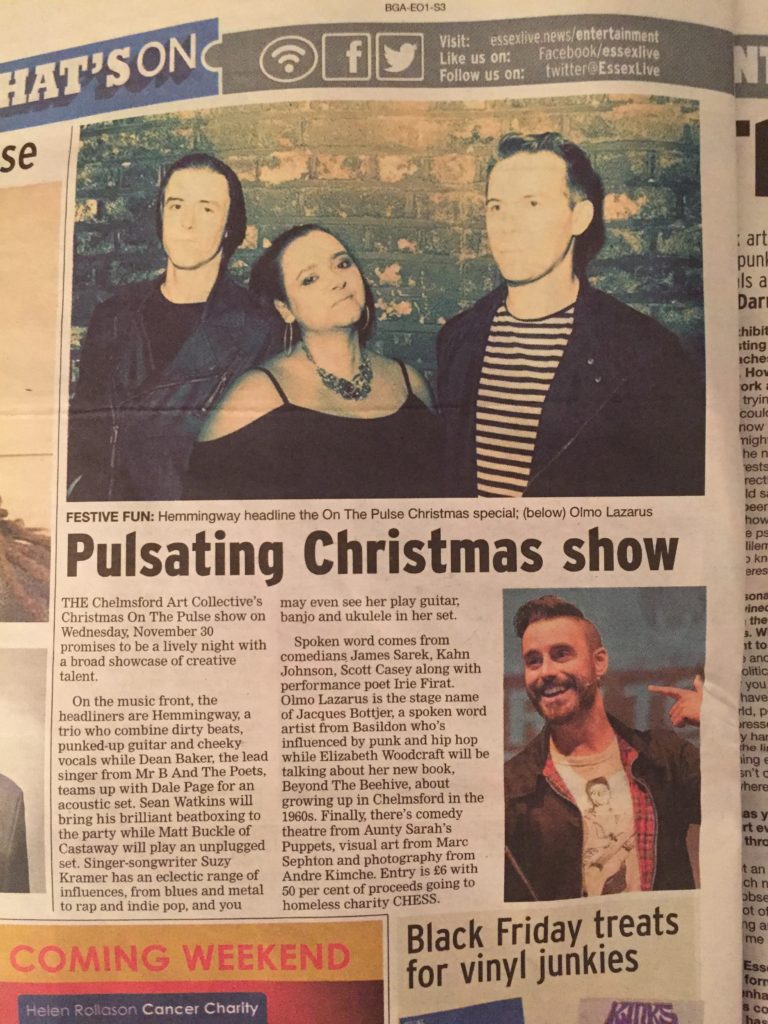
It’s strange to be introduced by a bear. But so it was. The compere for the evening was Carl Denham – we had bonded (I use this word advisedly) before the evening began because his day job is as an usher in Ipswich Crown Court. He has to wear a gown there, so perhaps (as is so often the case with barristers) he felt better in a uniform.
It was a hip crowd. Most people were wearing black. I felt a little formal and yet frivolous in my red waistcoat and velvet jacket.
If I say that there were no chairs I think I need say no more about the age of the audience. We had a short Masterclass in Mods and Rockers and I asked people to think which group they would have been in if they’d been there. It turned out they were all wannabe beatniks. But what a nice crowd. They listened, they really listened, as I read about a world they had only ever heard of in conversations over their heads as their mums and nans talked.
After me came stand up comedian Kahn Johnson, who had a robust personality, some good lines and a neat set. Then it was Ölmo Lazarus – a street, beat poet from Basildon. He had come hot foot from watching himself on C4 news.
And his poetry was good stuff, political, clever, funny. After him came Scott Casey in a reindeer costume (A little known fact about Chelmsford is its inate love of animals). It was a good set, and I loved the line ‘Every time Slade shout “It’s CHRISTMAS!’ a reindeer dies.” I know the feeling. And then it was Aunty Sarah’s Puppets – Aunty Sarah with an everyday story of pirate life told with stick puppets and audience participation.
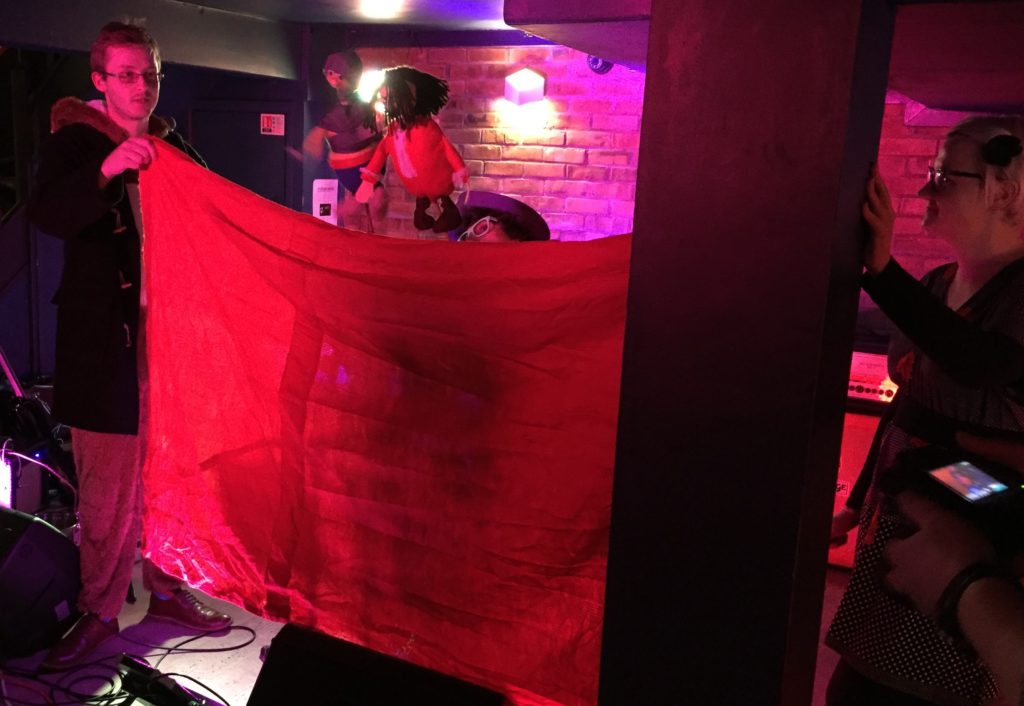 I so enjoyed the evening. There was a photographer Andre Kimche (he remembered mods and rockers! hurray), and an artist Marc Sephton whose work included portraits of Twiggy, the Rolling Stones and Spiderman. So in fact, I was not alone. And even Ölmo Lazarus made reference to mods and style and the importance of clothes. I was only sorry that I had to slip away before the music began.
I so enjoyed the evening. There was a photographer Andre Kimche (he remembered mods and rockers! hurray), and an artist Marc Sephton whose work included portraits of Twiggy, the Rolling Stones and Spiderman. So in fact, I was not alone. And even Ölmo Lazarus made reference to mods and style and the importance of clothes. I was only sorry that I had to slip away before the music began.
Love Chelmsford.
News and Beehive reviews
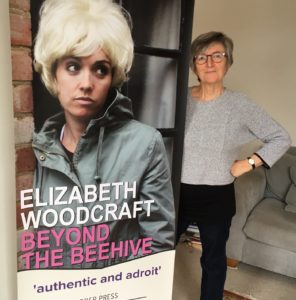 Preparing for the Beehive bash* on Saturday evening. We have the banner! Getting the books, the posters and the 60s quiz all ready to go.
Preparing for the Beehive bash* on Saturday evening. We have the banner! Getting the books, the posters and the 60s quiz all ready to go.
*Chelmsford Ideas Hub, 6.30 (Hub 1 1-4 Market Square High Chelmer Chelmsford CM1 1XF)
And so here are a few recent reviews. I know – all these three people are people I know, and one is even a relative, but I think their views deserve to be heard!
‘Buy the book everyone – I am on chapter three and it is good!’ Sue
‘On chapter 8 – it’s a great read so far.’ Christine
‘I’m half way through and can’t put it down.’ Billie
STOP PRESS
‘I am a slow reader but now on chapter four and it is still good.’ Sue
What more can I say? The book is available and will be on sale on Saturday evening, when you can get yourself a signed copy AND listen to the magical sounds of Mark Shelley and the Deans.
You can also buy it here.
In the meantime – listen to the sounds that mark that start of the book – Green Onions, by Booker T and the MGs.
Birthday stories – Peggy Perry 1924-2016
Readers of this blog will have gathered that my aged mother who was living with me, died in January this year. Last week it was her birthday, she would have been 92.
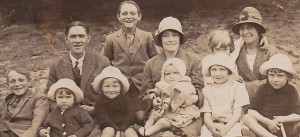 On the day, my sister, my brother and I with various partners and off-spring all met to remember mum on a day that for her and for us was always very important.
On the day, my sister, my brother and I with various partners and off-spring all met to remember mum on a day that for her and for us was always very important.
Mum was born Peggy Maxwell King, the daughter of Edwin Horace Alexander King, a tailor to the working man, and Elsie King. There were twelve children – Peggy was born after Gladys, Jack, Sid, Honor, Iris, Don, Alec, and Vera, and before Sheila, Rita, and Beryl.
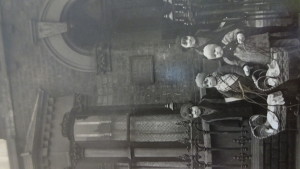 They lived in a terraced house in Leytonstone – 5 Ranelagh Road, where Peggy shared a room with Vera at the back of the house. They were not easy times, they were not well off. Their dad made their school uniforms out of off-cuts of material from his work, Peggy had a black and white pin-striped tunic. She was sure everyone could tell they were made of cloth for gentlemen’s trousers.
They lived in a terraced house in Leytonstone – 5 Ranelagh Road, where Peggy shared a room with Vera at the back of the house. They were not easy times, they were not well off. Their dad made their school uniforms out of off-cuts of material from his work, Peggy had a black and white pin-striped tunic. She was sure everyone could tell they were made of cloth for gentlemen’s trousers.
She went to Cann Hall Infants School and then Tom Hood. She was very sporty – she had badges for netball and athletics. Unlike the rest of her family, she was a regular attender at her local church, and she was strict TT – alcohol did not pass her lips. She was also an ardent member of the Girls Life Brigade.
She was an autograph collector – George Formby, Nosmo King, and Henry Hall were all in her book – but her great favourite was the Street Singer, Arthur Tracy. An American who came to England to play in the music halls she loved him. Once she walked all the way from Leytonstone to Stratford Empire to queue for an hour to get a front row seat to see him perform.
Peggy and her sisters had had a pretty hard childhood (except for sister Iris who lived with Aunt Eva and wanted – so the others thought – for nothing). There was not a lot of money and not a lot of love. They had to save up for their bicycles, but then they were free to ride where they wanted. Peggy often flew in late for meals, from a day’s cycling in Epping Forest, her face all red and glowing, to be chastised by her mother.
Her love of Walton on the Naze lasted her whole life. When she was a child the family would go there every year for their holidays – their dad would drive down on the Friday and pitch the tent and then come back for the kids who would drive down with him on the Saturday.
In 1939, when they were in Walton on holiday, the war started.
The younger children were evacuated from the bombing, for a time to Shenfield & Peggy had to leave school to look after the younger children. Then they came home but the air raids were taking a toll on the family, and their Aunt Eva – with whom sister Iris lived – said, ‘Come to us for a good night’s sleep. Bombs don’t drop on Woodford.’
So on the night of 28 September 1940 – Vera and Rita cycled over to Woodford and the others came with their mum and dad in the car which was full of blankets and pillows. After some discussion as to who was to sleep where – my Aunt Honor and mum swopping places in the living room – they went to bed and a bomb fell onto the house. Their mum and dad, sister Honor and Aunt Eva, were all killed. The other sisters were pulled out of the rubble by the A&R men, without a scratch.
After that the girls were separated for a time. Eventually they all went to live in a bungalow in Chatham Green and mum’s life in Chelmsford began. They lived in Chatham Green until the end of the war then moved into a flat in Duke Street in Chelmsford opposite the bus station (from where in later years we used to watch the carnival procession).
Mum worked at Cromptons and it was there she first set eyes on our dad – Alf Woodcraft, the union rep of the Amalgamated Engineering Union (AEU).
In 1947 they married, honeymooned in Walton, and moved to Ockelford Avenue, a small crescent off North Avenue, on the Boarded Barns estate in Chelmsford. Teresa was born and then me. We moved to the Woodhall Estate
and a few years later, Edward was born.
By now Alf was the District Secretary of the AEU – a full time job, with an office in London Road in Chelmsford. Peggy didn’t work – Alf was pretty traditional and didn’t want his wife working. But she went potato picking, fruit picking, even stone picking. Gradually attitudes changed and she got a permanent job as a clerk in Chelmsford prison and later at County Hall as a coder.
One of my best memories of my childhood is coming home from school on a rainy afternoon, the light would be on in the living room and there would be a fire in the grate, mum would be ironing and Mrs Dale’s Diary would be on the wireless. Tess and I both remember times when we were ill and were home in bed mum always bought us a comic. For herself she liked chocolate – Cadbury’s Fruit and Nut. Alf would buy her a bar every evening on his way home from work, with a copy of the Evening News.
In the 50s we only had a BBC TV at home, mum disagreed with advertising on TV, and Edward remembers her being appalled one day seeing a young neighbour walking down the road singing ‘Murray Mints, Murray Mints, Too good to hurry mints.’ She soon got over it.
Alf left home in 1971 and Peggy was quite lonely and sad for a time – divorce was not a common occurrence on our estate. Edward was still living at home then and remembers their Friday night TV viewing. Take Your Pick, followed by Burke’s Law. And whenever possible, Morecambe and Wise or The Two Ronnies. An orange would be cut into quarters with the bread knife by way of refreshment, and the peel put by the fire to dry to serve as a fire lighter the next day, along with twisted pages of the Guardian and kindling and coal. The skill of making a fire stood him in good stead as a student.
Peggy had very recently become a social work assistant in Braintree, working with the elderly and the job gave her great satisfaction. One of her proudest achievements was helping two women who had been incarcerated in a mental institution since their youth – for small misdemeanours, I think for getting pregnant. Mum got them into a small flat of their own. She often visited them and they were gloriously happy.
And then along came the grandchildren. What enormous joy they gave her.
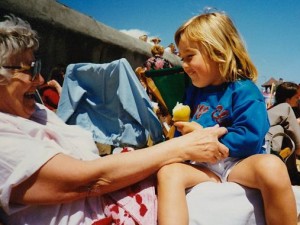

 Billie remembers going to stay with grandma and having a very structured day around food, including elevenses – always a long iced bun, and later, after tea, supper – a salad sandwich with salad cream. Every morning they would study the TV guide and plan what programmes they would watch later. They watched all the soaps together, and when Billie went home they would ring each other up to discuss the goings on in EastEnders or Coronation Street.
Billie remembers going to stay with grandma and having a very structured day around food, including elevenses – always a long iced bun, and later, after tea, supper – a salad sandwich with salad cream. Every morning they would study the TV guide and plan what programmes they would watch later. They watched all the soaps together, and when Billie went home they would ring each other up to discuss the goings on in EastEnders or Coronation Street.
Jack remembers staying and evening baths being timed round the advert breaks in their favourite TV shows. He also had a memory of finding a bird with a broken wing in the garden. Gently they gathered it up and put it in a cardboard shoe box filled with cotton wool. They kept it in the shed for three days, feeding it, watching it, but then it died.
In 1994 her life changed dramatically again. She renewed her friendship with Roy Perry. His late wife had been a friend of hers from school days in Leytonstone, and Roy had been in the same class as her brother Don. They married in North Avenue church and mum moved to West Mersea, a small island just outside Colchester. Roy gave her the happiness and companionship that she had been missing for so long. Sadly Roy died two years later.
Mum moved back to Chelmsford to live for a short while with her sister Vera but then moved into a flat in Squirrels Court – back onto the Boarded Barns estate where she had started her married life and where she had been so involved with North Avenue church.
There were so many sides to her personality. Sister Vera once said to me that she thought of Peggy as a Romantic Rebel and I think that is a fitting description of her. Caroline remembers visiting the house and apart from all of us just sitting reading the newspapers, remembers discussions, about politicians, the issues of the day, TV programmes. She was very supportive of Channel 4 and regularly watched the very difficult (for some of us) documentaries that formed the Eleventh Hour slot, from Alan’s department.
Billy Graham, an American evangelist who was very popular in the 50s, was a person who featured large in our childhood. But Peggy’s chosen church was Congregationalist (later the United Reformed Church) – almost as simple and austere as you can get in a religion, except perhaps for the Quakers. She put her religious beliefs into practice. She was a popular and dedicated Sunday School teacher – so the space under our stairs was always filled with pieces of paper and crayons and glue and the cardboard centres of toilet rolls. We all went to Sunday School, and once a year in June we all got onto buses and coaches and went to Walton-on-the-Naze for the Sunday School outing.
When I was sorting out her flat after she moved to London, I found little bundles of card, cut from Shredded Wheat boxes, Rennies packets, the back of birthday cards, tightly wrapped with an elastic band. She went regularly every year collecting for NSPCC. As children we sat round the coffee table (we had a coffee table!) counting the money, making piles of the coins.
Everyone in the 50s was aware of the A bomb and H bomb. Peggy was a member of Chelmsford CND and would chair meetings at the Friends’ Meeting House. In 1958 she went on the first ever Aldermaston march. She wouldn’t let us go on the marches until we were 12 for fear people would think we were being indoctrinated.
She was a staunch member of the Labour Party and at election times, delivered leaflets, canvassed and went knocking up in support of local candidates (of whom Alf was occasionally one). She espoused feminism, and caused some consternation in North Avenue church when she would change patriarchal words in hymns and prayers to include women. She became a member of Braintree Women’s Aid. She went to Greenham Common peace camp, where she had her first cup of herb tea, sitting round a camp fire. She was also one of the Braintree Five when cuts were proposed in Braintree Social Services.
She enjoyed and advocated paying tax because it was for the good of everyone in society.
And now a question:
Why do bees hum? When I was clearing out Peggy’s flat I also found numerous little piles of cracker jokes. She loved them.
This last picture is very typical of Peggy. She has just finished her Shredded Wheat – she ate it every day, almost till the day she died. Beside her is a jar of Shredless Marmalade and a slice of toast. She is doing the Guardian crossword, while on the table is a copy of the Daily Mirror, ‘the paper that cares’, waiting to be read. Contentment.
Because they don’t know the words.
An Awfully Big Occasion
It is all go in Chelmsford, preparing for the launch party of A Sense of Occasion.
The Saracen’s Head will be humming – just as it did when mods dropped in, lurching from the Lion and Lamb, via the Golden Fleece and the White Hart, parking their scooters outside, slipping out of their parkas.
The play list for the launch has been one of the most important features. As regular visitors to this website will know, the stories in A Sense of Occasion trace the lives of four mod girls in the 60s – love loss laughter and scooters. So the music has got to catch the essence. The Four Tops, Spencer Davis, Green Onions, a smattering of the Beatles, James Brown, Donnie Elbert and more. Just listening to the tracks now is like being at the Corn Exchange on a Saturday night. Everyone smelling their best – Old Spice or Avon’s Wishing. Everyone looking their best in their suede coats and their Hush Puppies.
Books will be on sale, books will be signed. There will be a prize for the best mod outfit. There will be lights, there will be music. Can’t wait!
https://www.youtube.com/watch?v=UhwrSTWAHV8
Hear more great tracks at The Sixties Made Me

